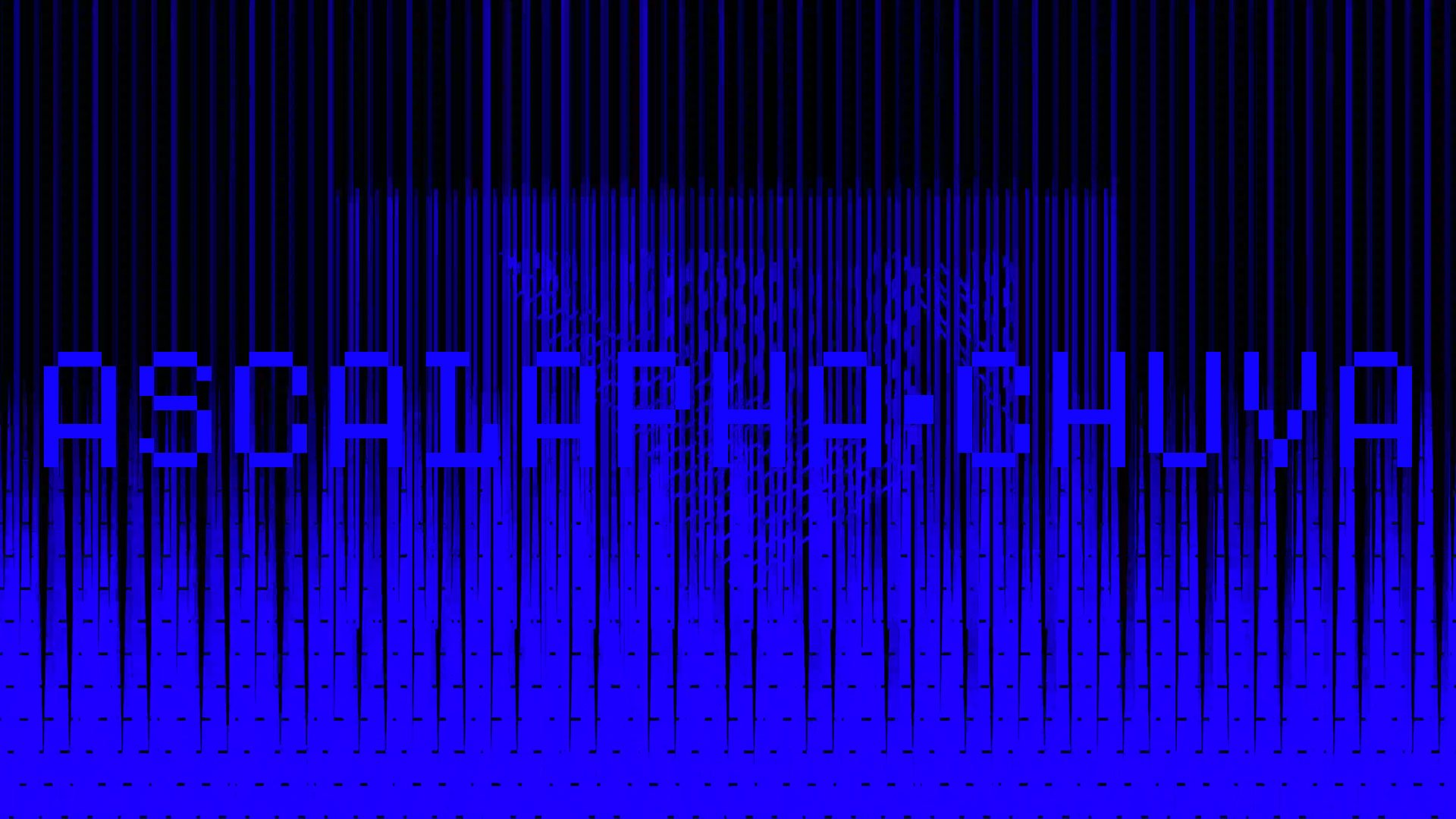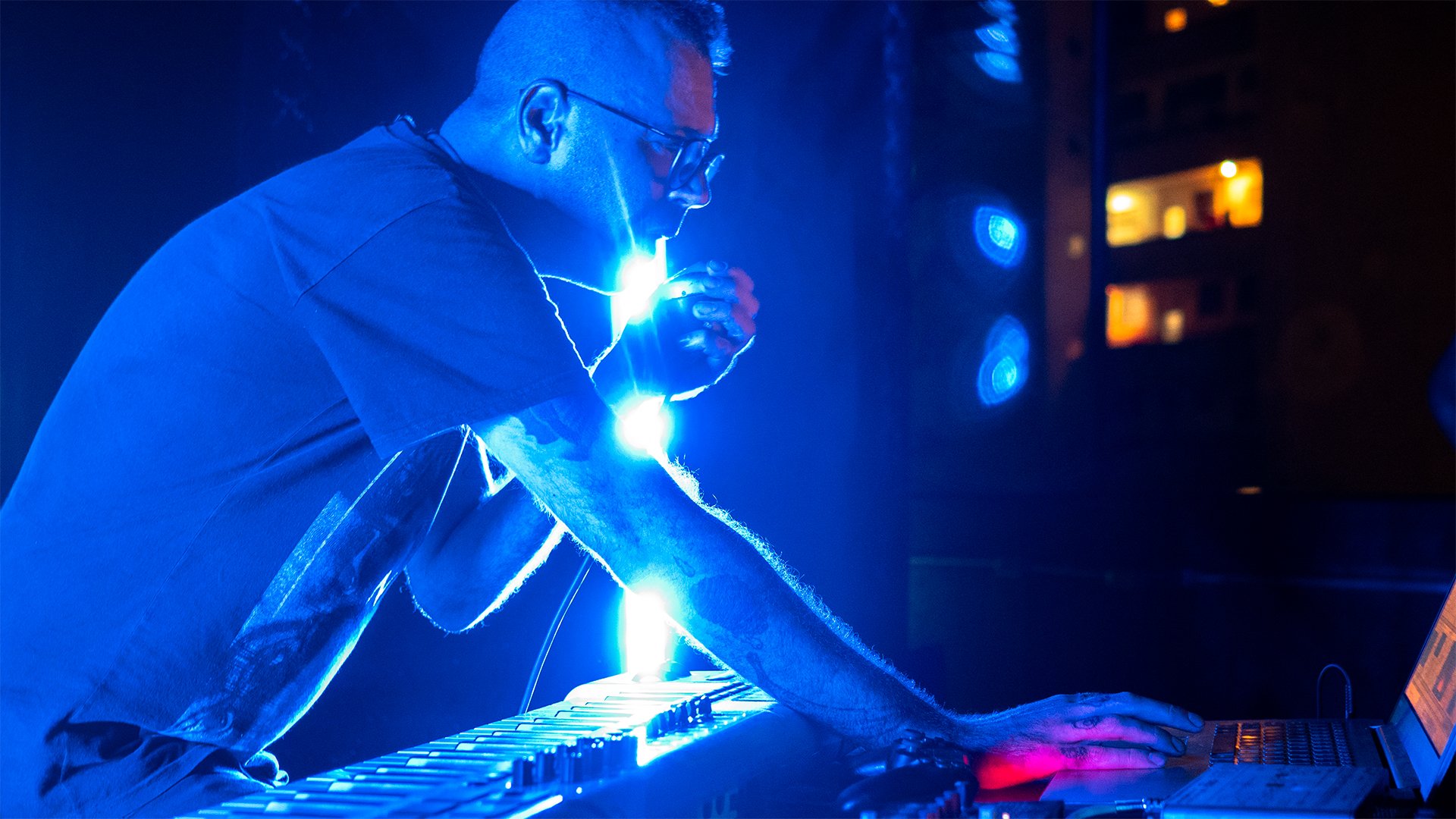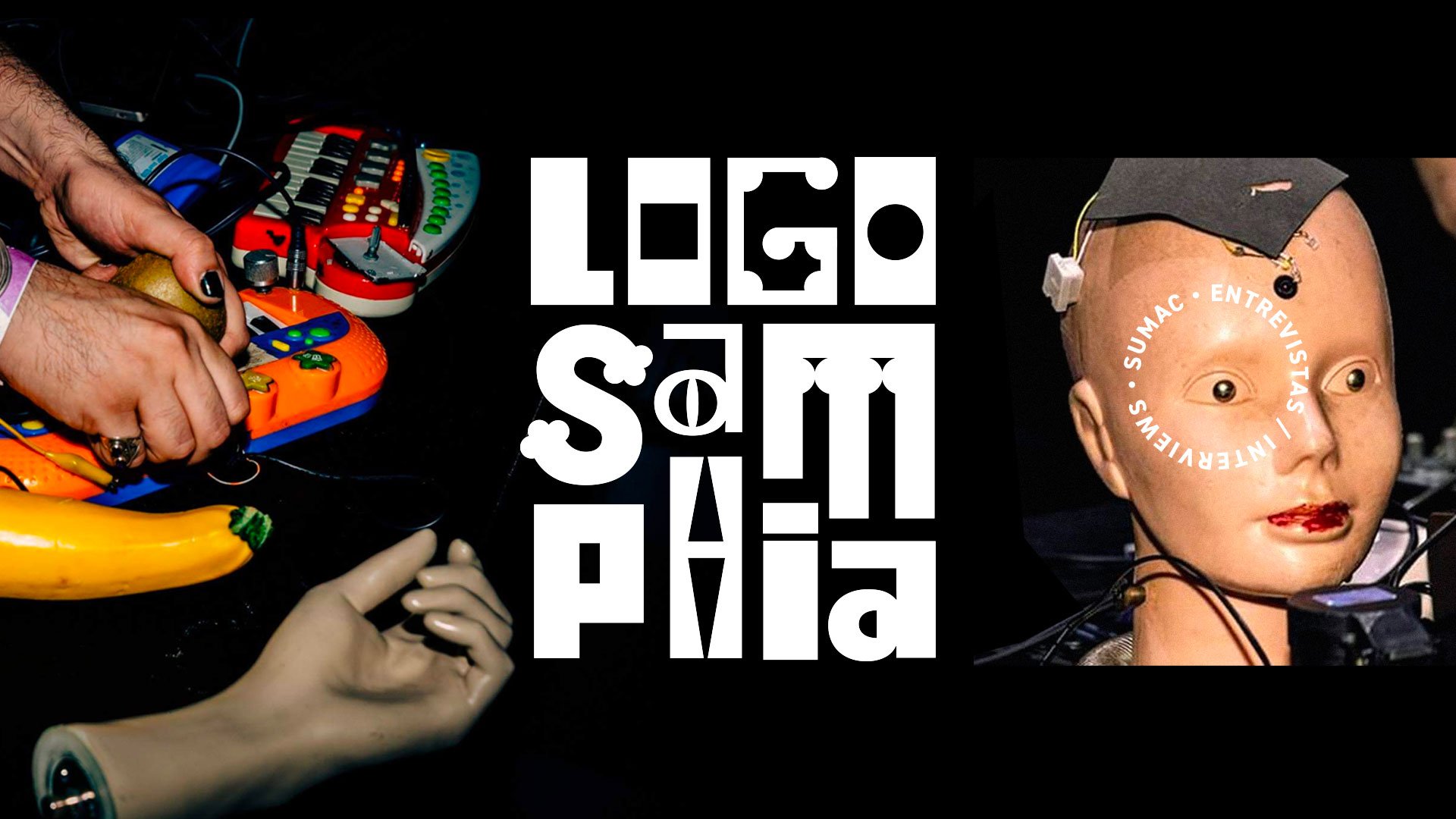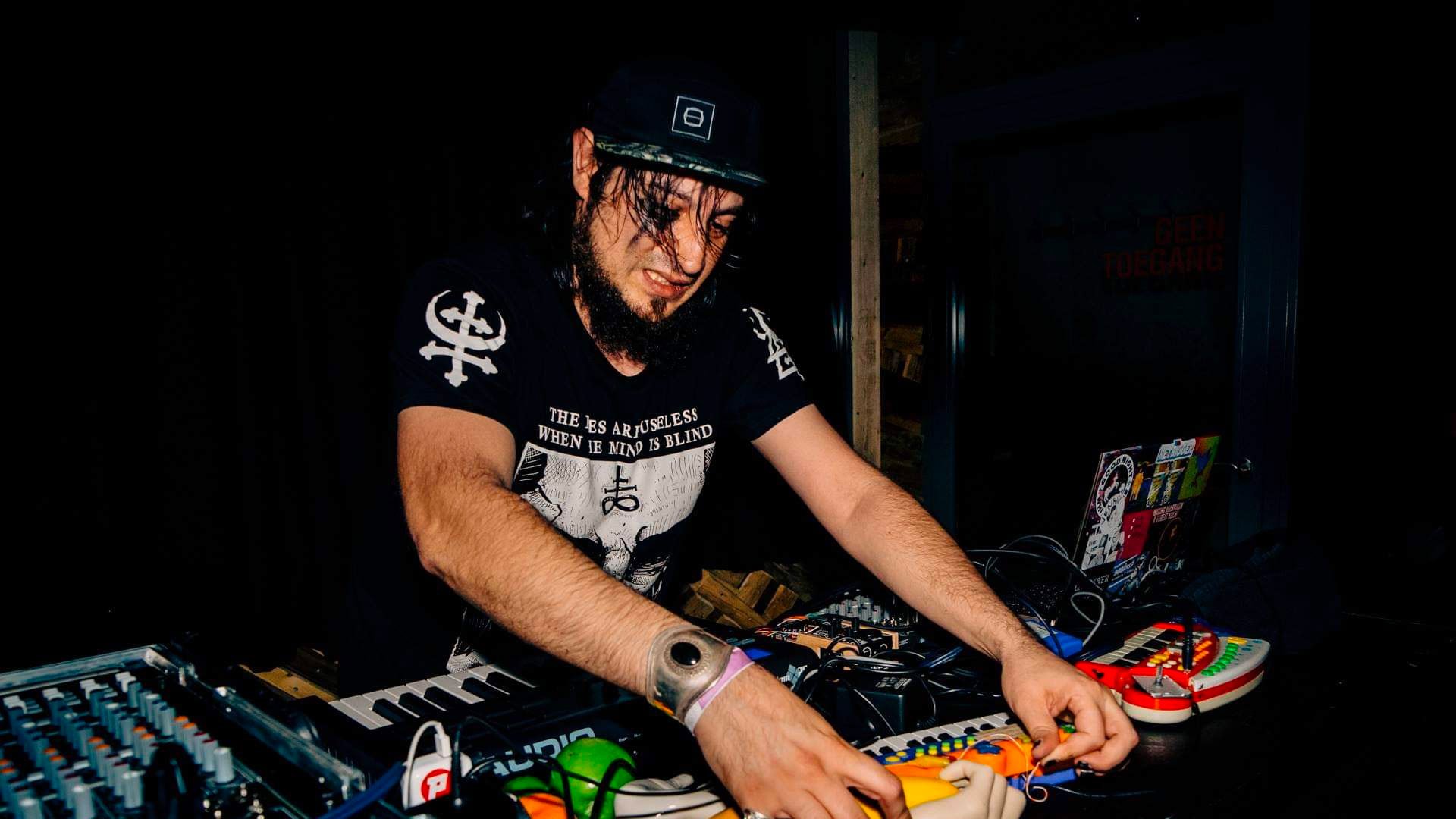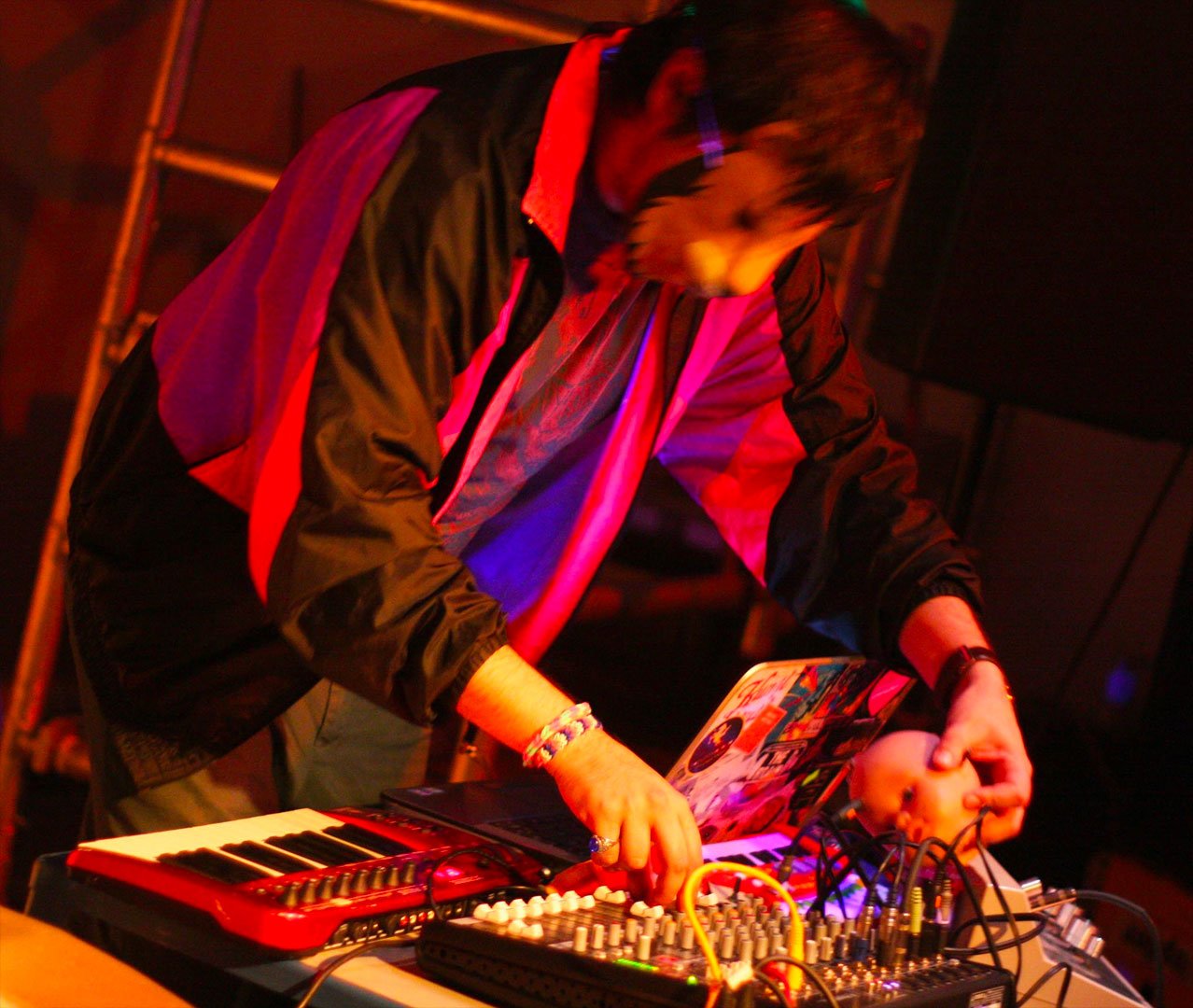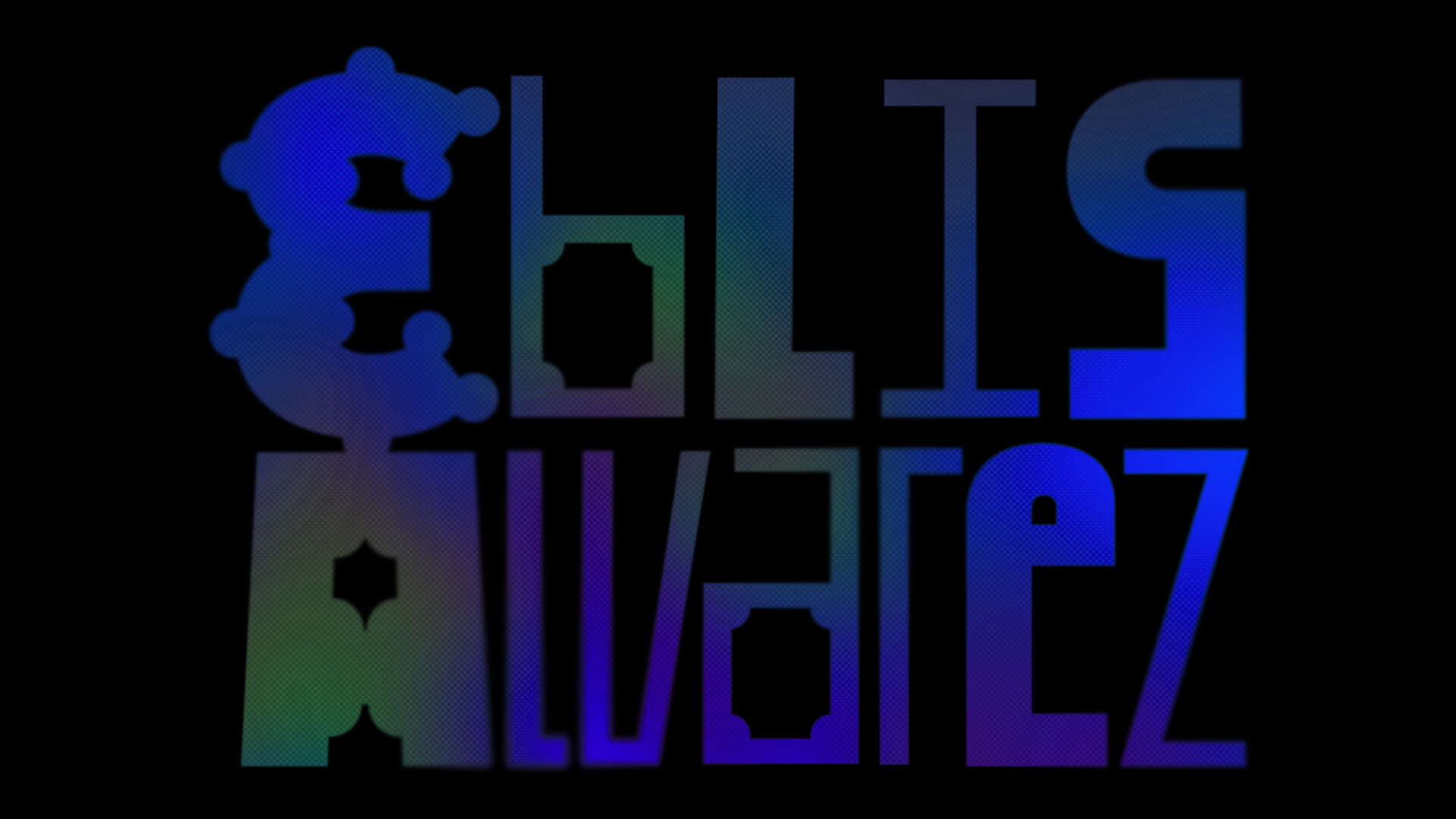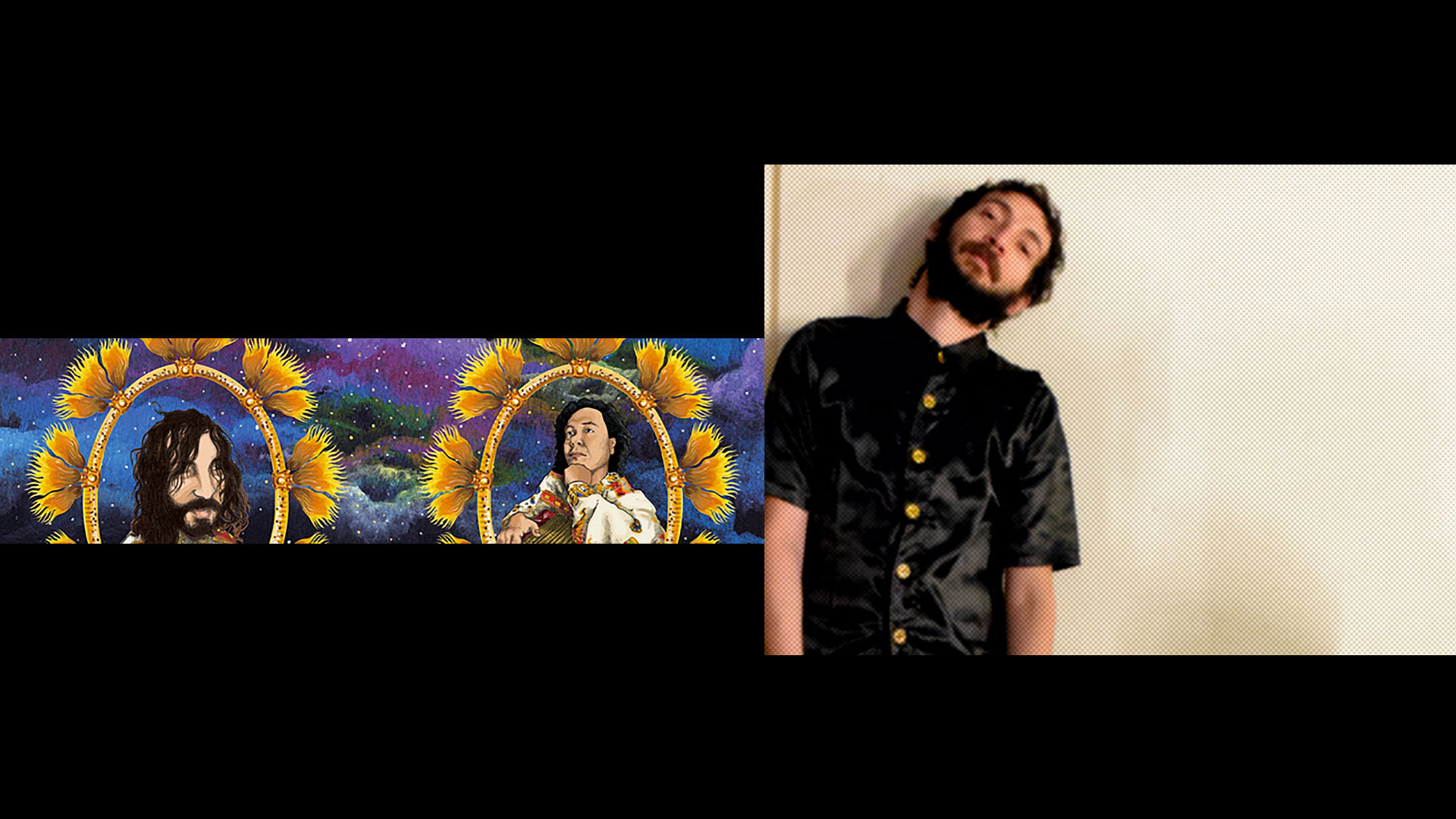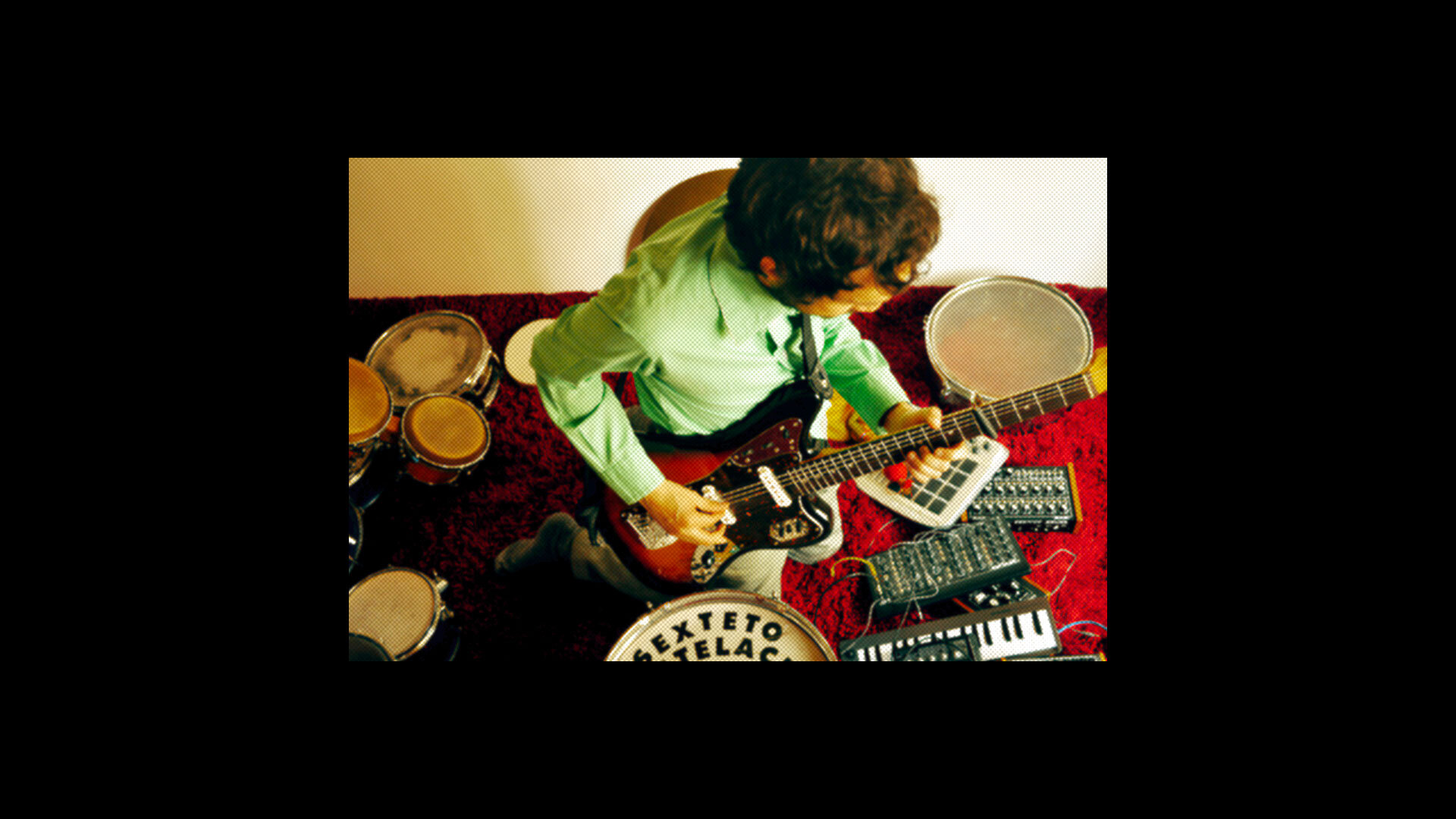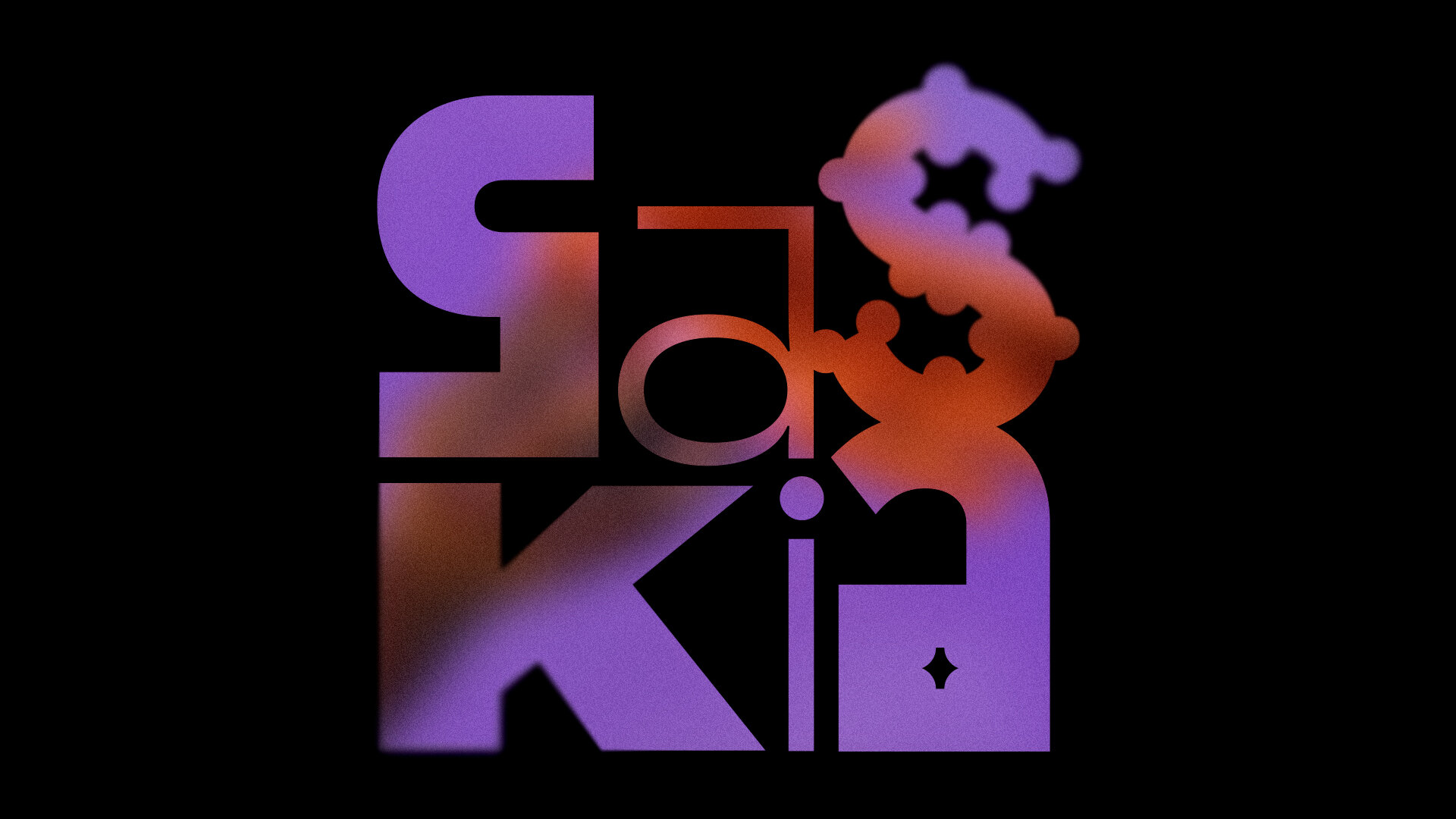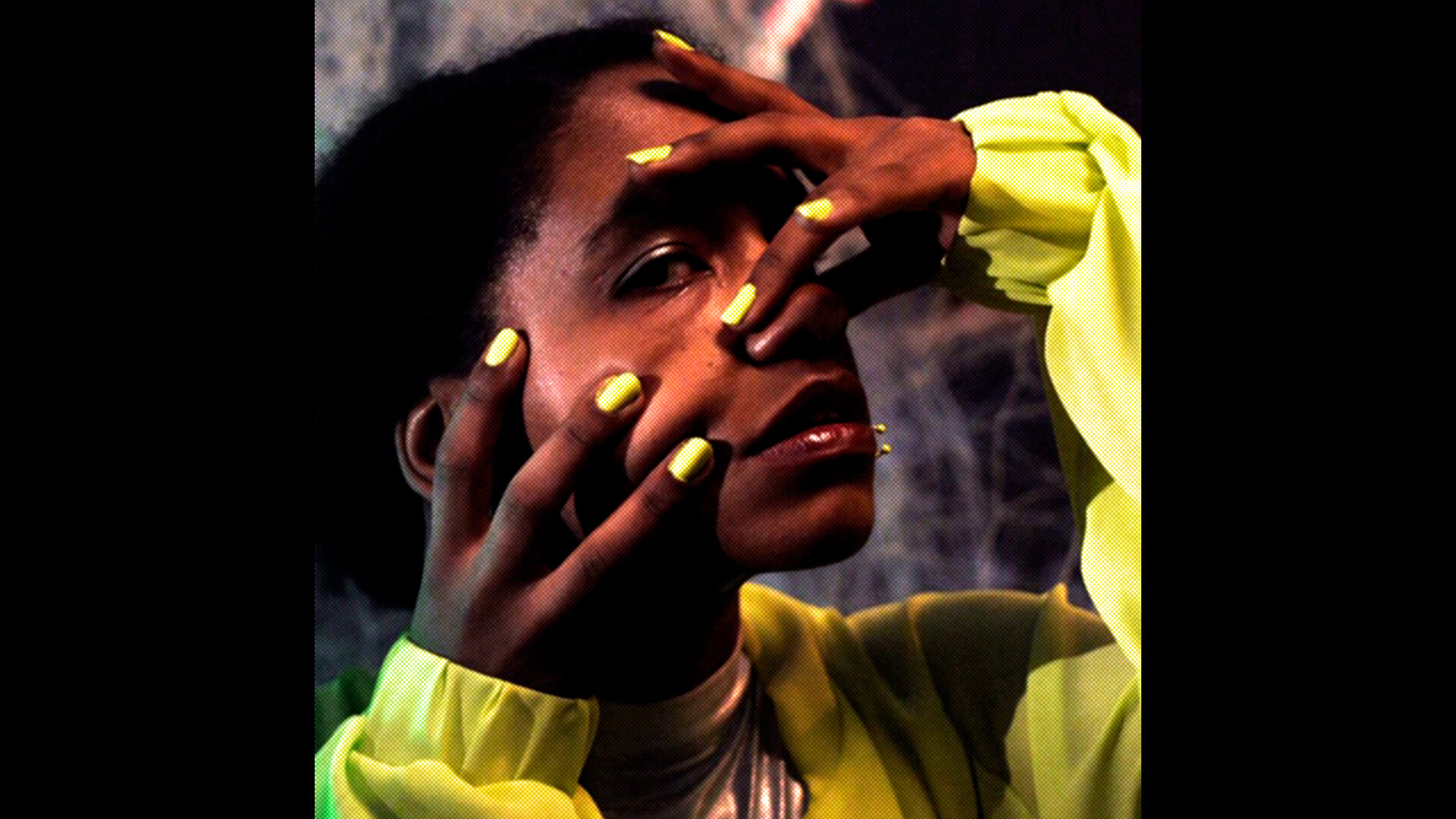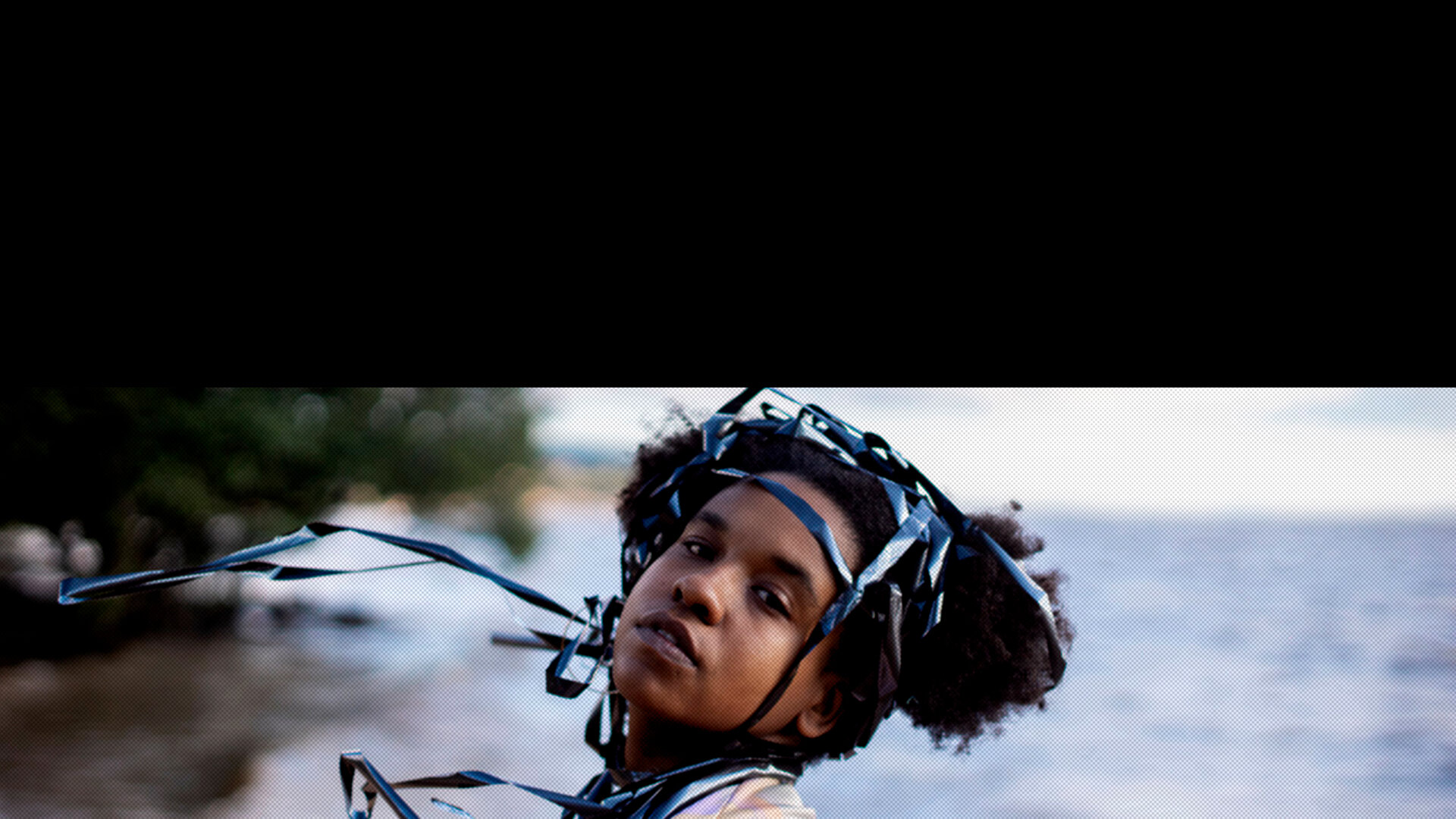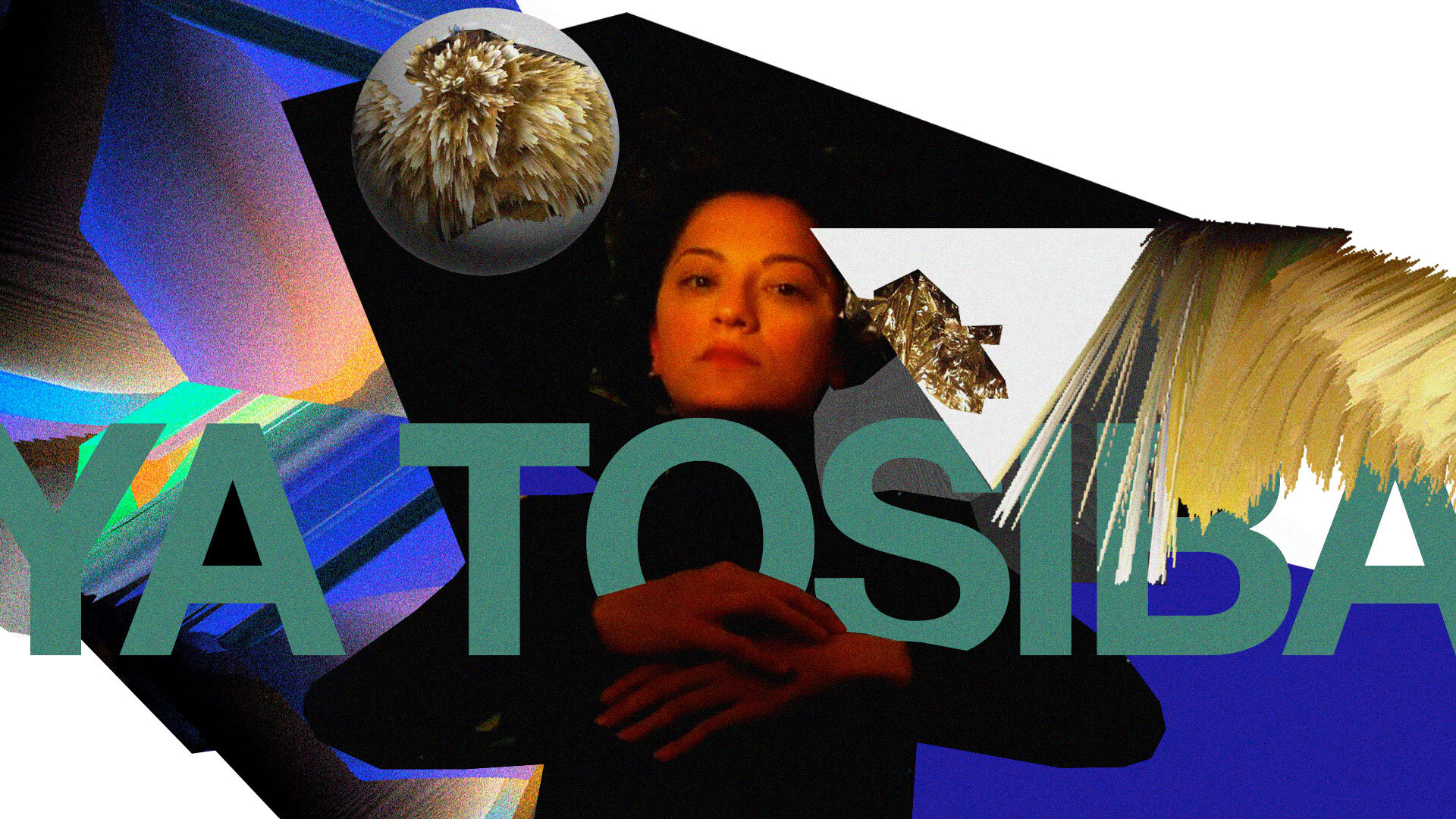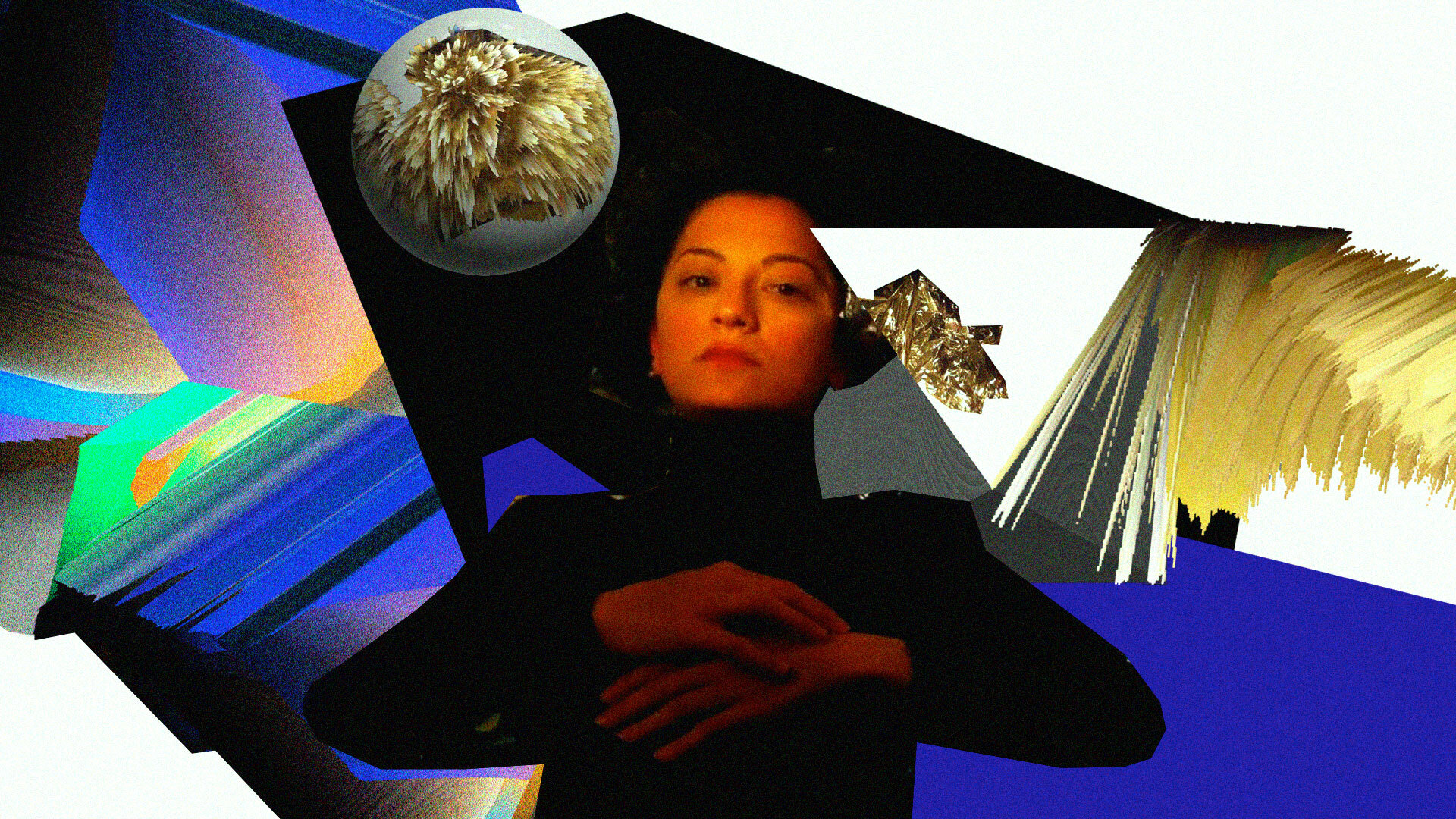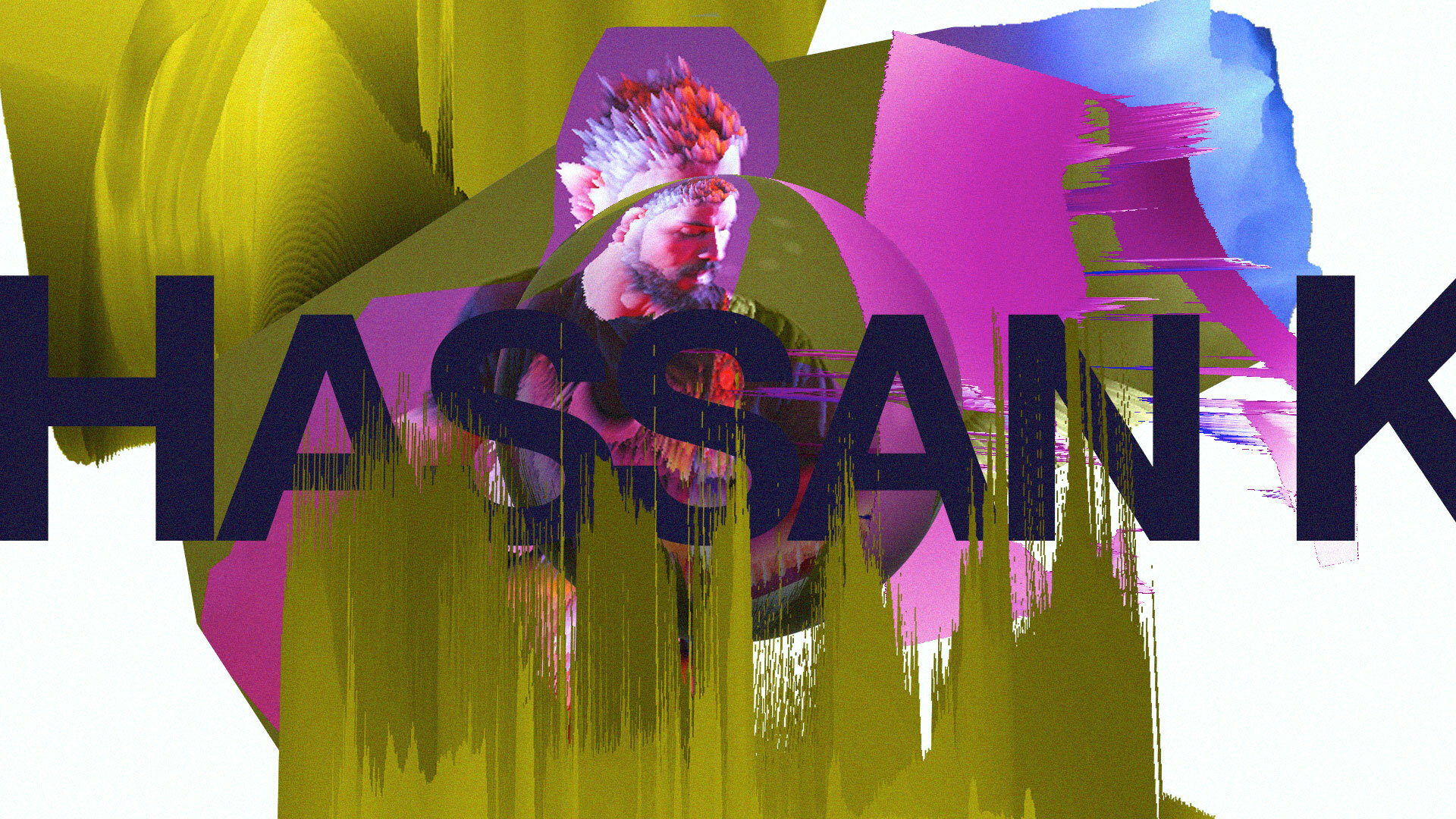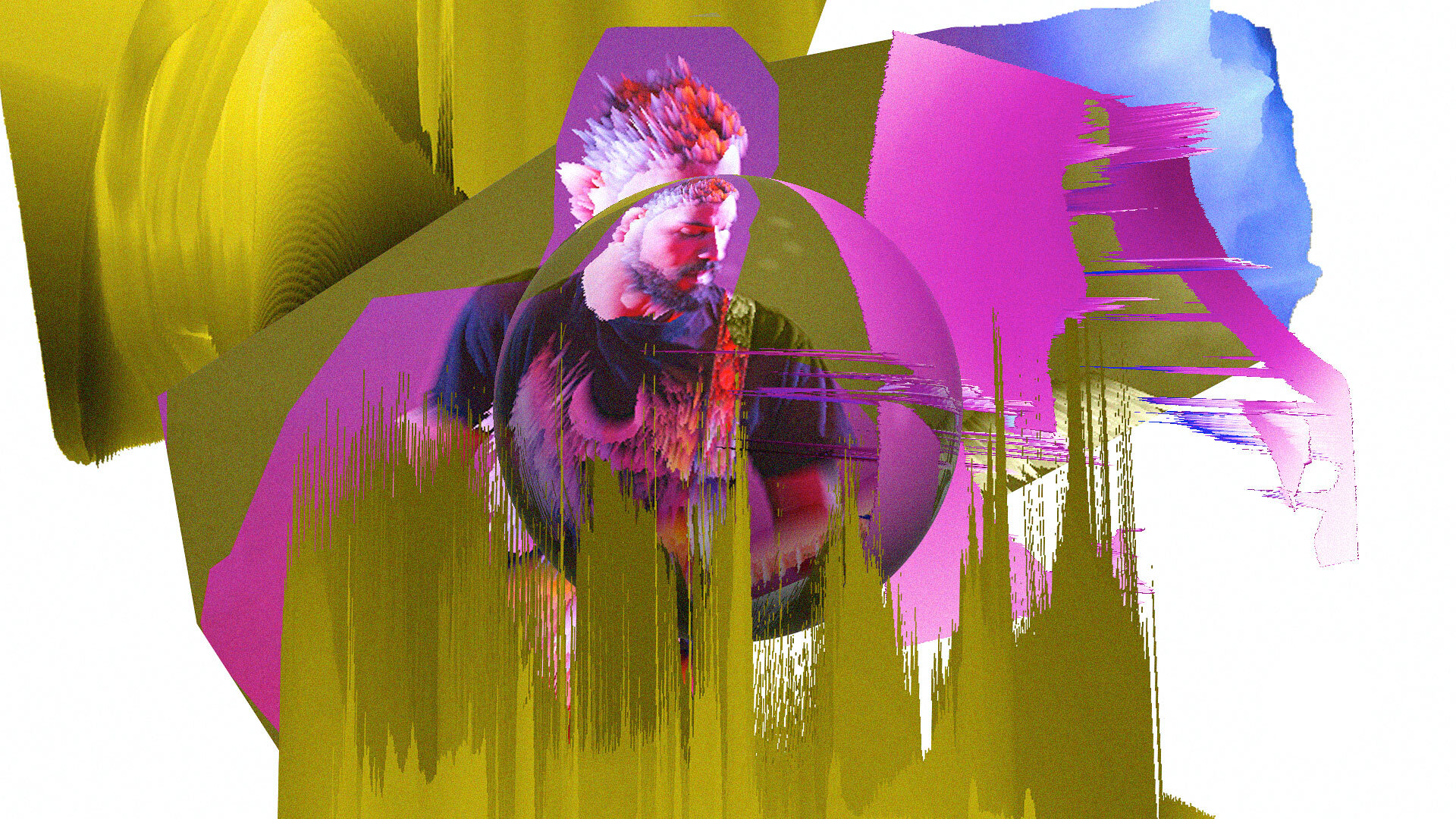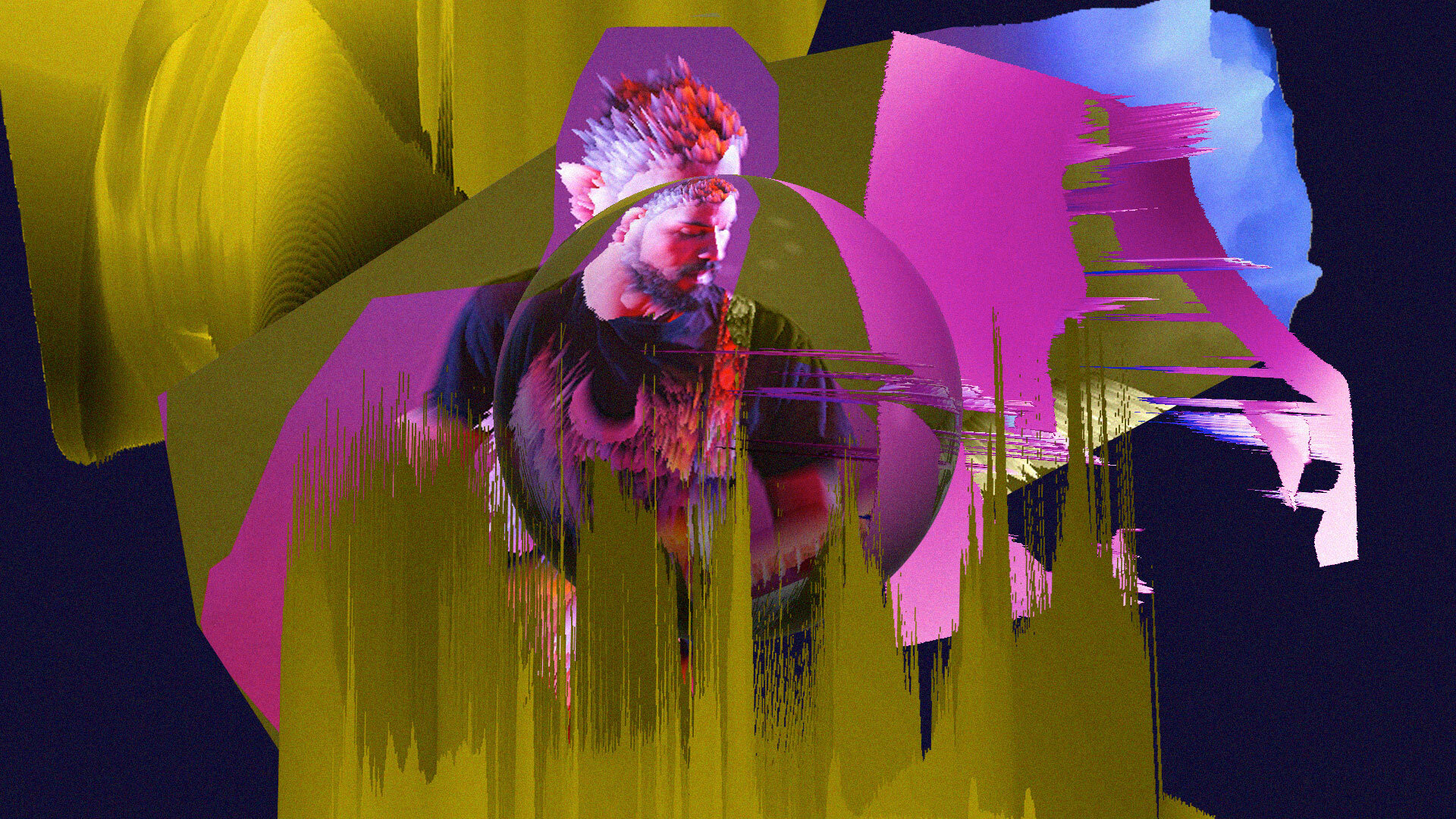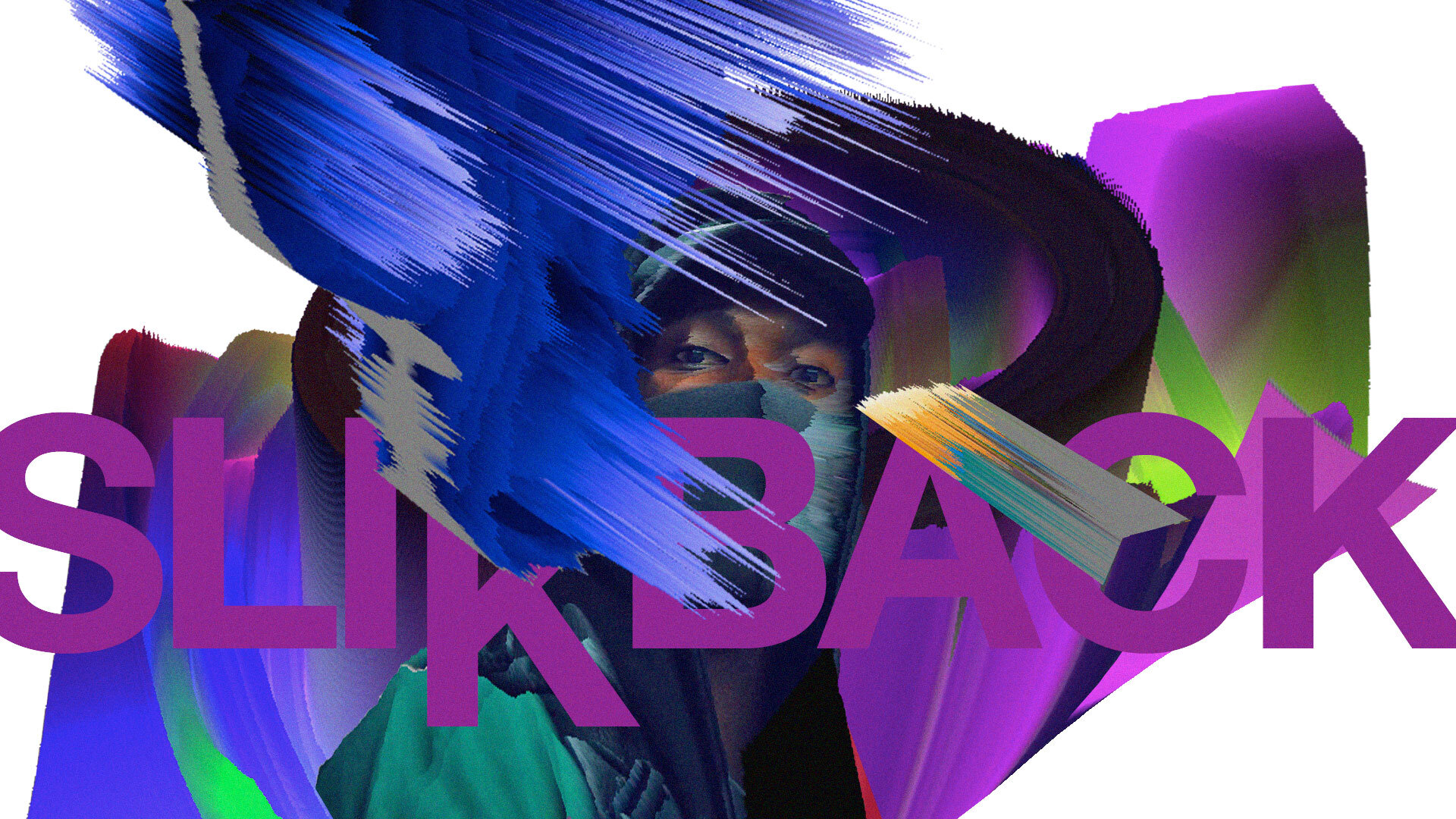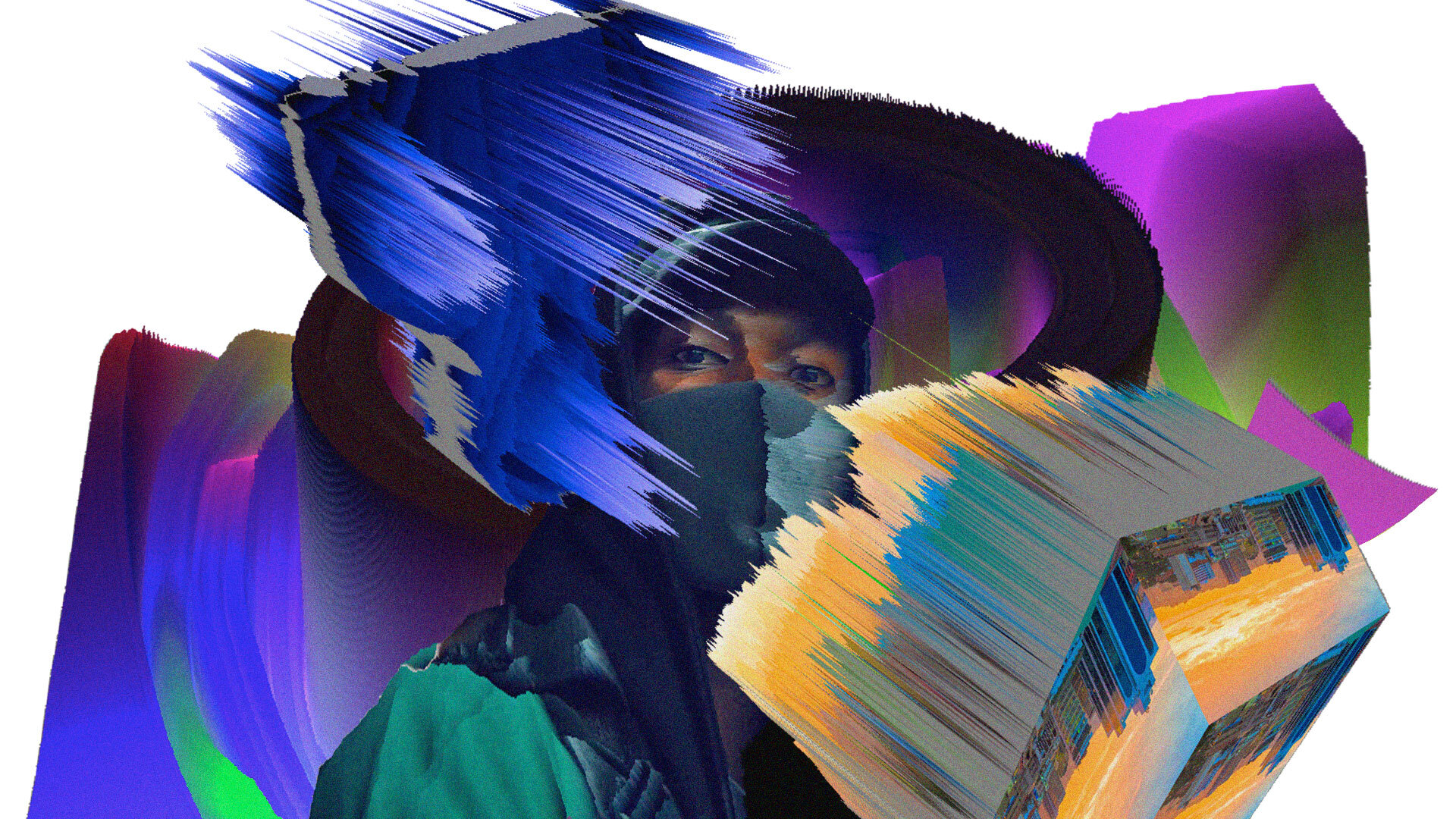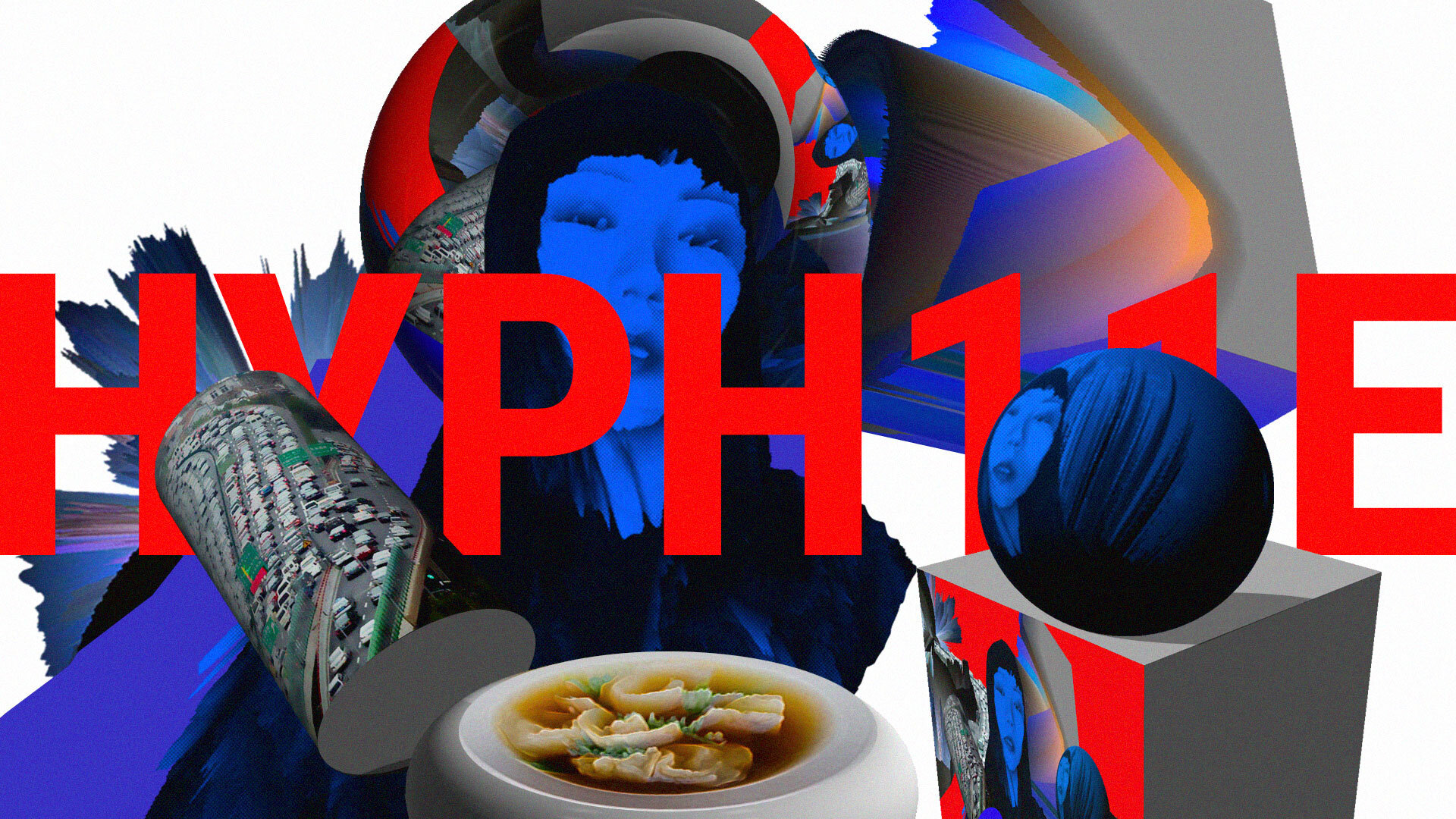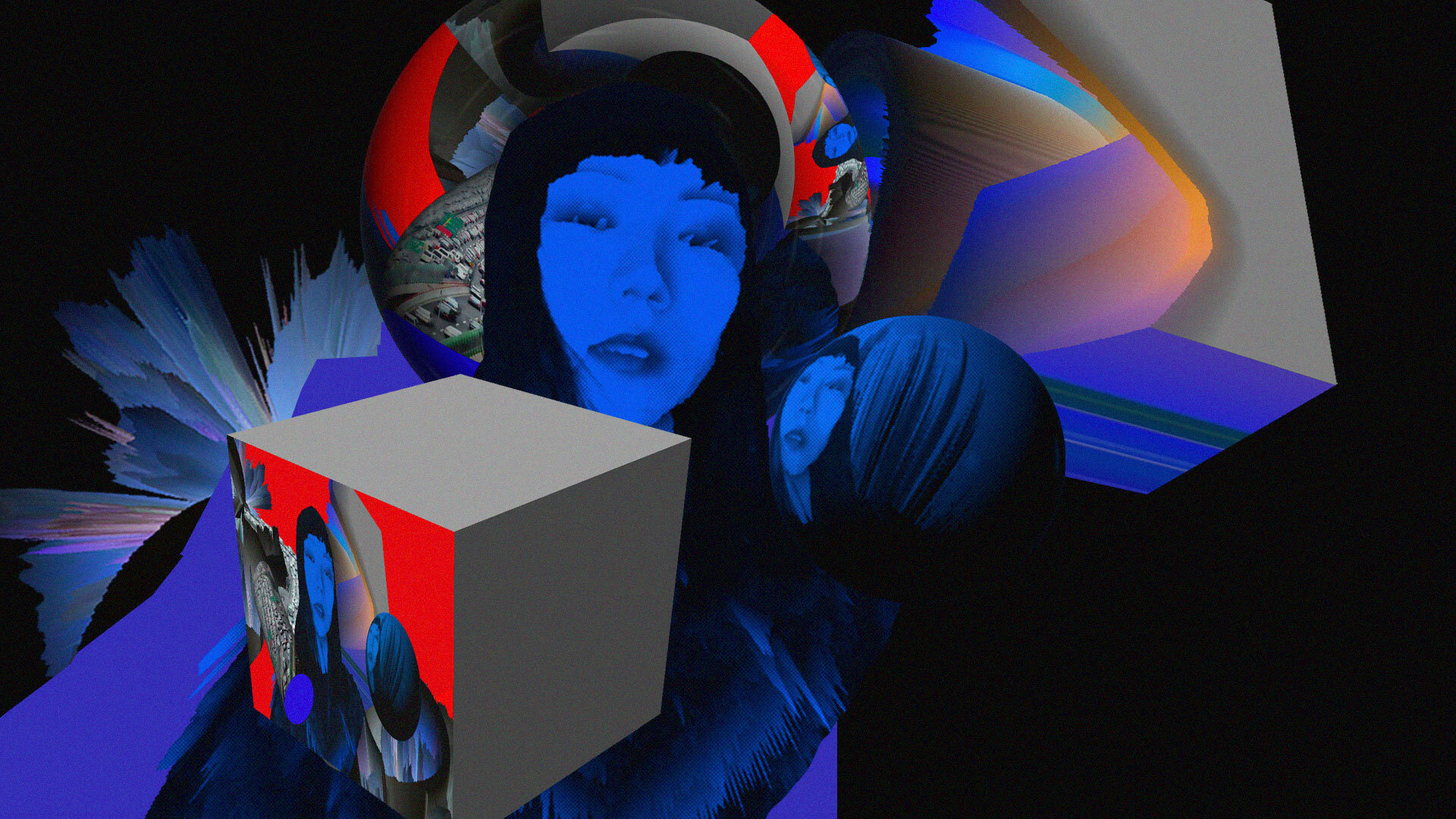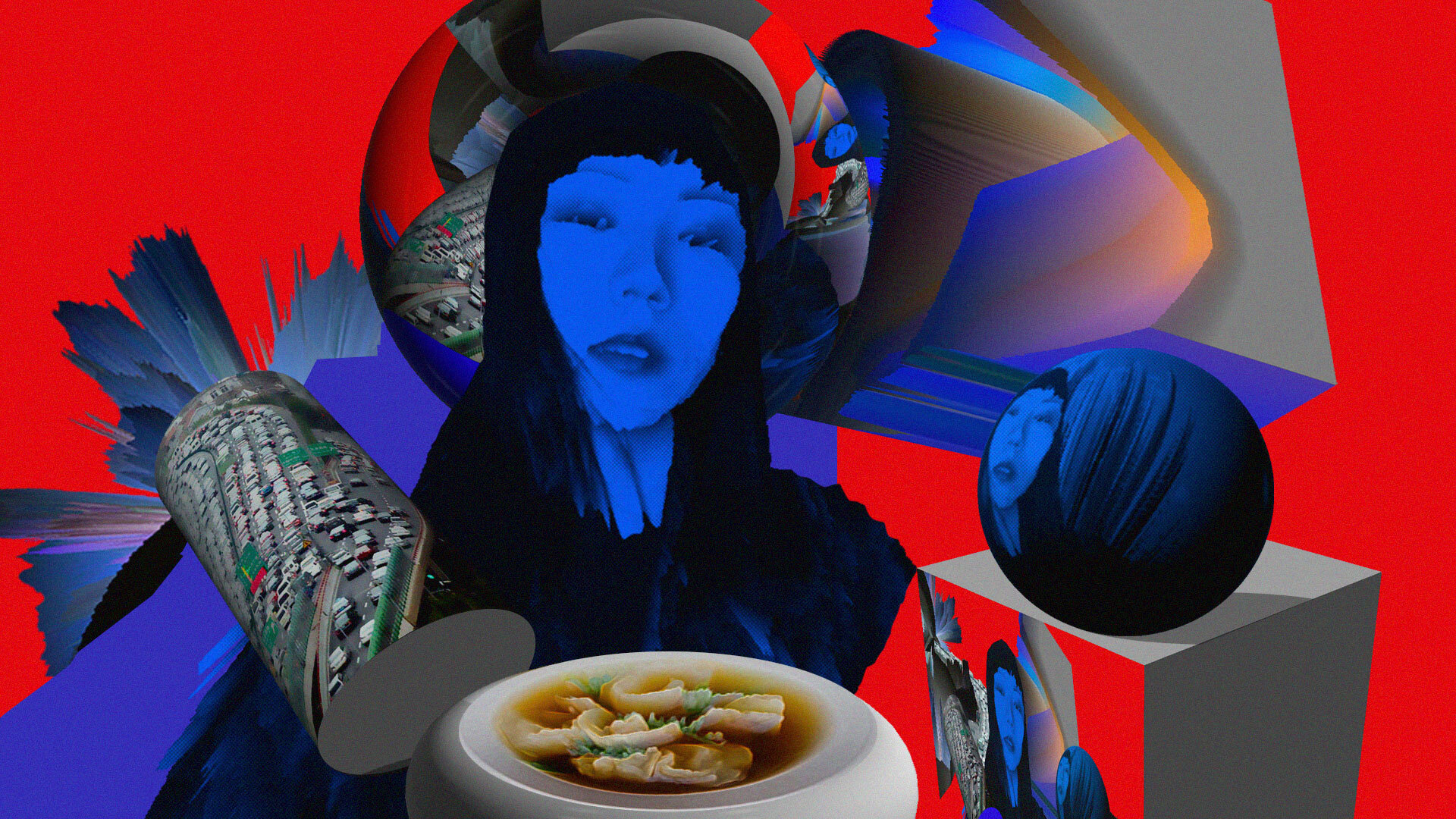• SUMAC •
Música eletrônica incrível para ouvidos intrépidos. Do mundo inteiro.
O mundo é uma coisa muito grande e, por algum motivo, e por muitas vezes, ele acaba sendo resumido ao que acontece no Atlântico Norte.
Criado por Raul Costa/Retrigger e Iago Mati, SUMAC cruza o globo para apresentar a música que se faz na América Latina, África e Ásia por meio de conversas com artistas a convite de/em entrevista com Raul, músico eletrônico de música esquisita e pesquisador assíduo do que acontece onde quase não se vê.
Incredible electronic music for intrepid ears. Worldwide.
The world is this very big thing, and for some reason, and many times, it ends up reduced to what happens in the North Atlantic.
Created by Raul Costa/Retrigger and Iago Mati, SUMAC crosses the globe to showcase the music made in Latin America, Africa, and Asia through conversations with artists invited and interviewed by Raul, this electronic musician of freakish music and avid researcher of what goes on where it is barely seen.
EP / EP
• • Ascalapha • •
ENTREVISTAS / INTERVIEWS
VÍDEOS / VIDEOS
• • Ascalapha • •
Composição: Raul Costa Duarte
Gravação, mixagem e masterização: Raul Costa Duarte
Estúdio: Armênia
Vídeo: Iago Mati
Composition: Raul Costa Duarte
Recording, mixing, and mastering: Raul Costa Duarte
Studio: Armênia
Video: Iago Mati
Em meio a guerras, tragédias ambientais e desigualdade rampante, Ascalapha vai em busca de um otimismo pós-apocalíptico. Cada vez mais, parece que estamos perdendo a capacidade de sonhar outra vida, outras possibilidades. Em livros, filmes e pesadelos, espelhamos a distopia que se nutre no presente de um capitalismo destrutivo.
Como sonhar um outro futuro?
Em busca de uma resposta, Raul Costa apresenta seu novo projeto após mais de 20 anos como Retrigger.
Com graves poderosos, percussão fraturada, síntese digital e experimentalismo, o objetivo é uma ficção científica da utopia, a superação do realismo capitalista que consegue imaginar o fim do mundo, mas não o fim das estruturas que vão destruí-lo.
O single traz três faixas: em “Chuva”, Raul usa sua voz em letra que fala do desejo pela esperança mesmo que perdida. E acompanham o lançamento a parceria com a poeta Jeanne Callegari, na faixa “Digitais”, e o remix da faixa título realizado pelo produtor untilde.
Esse é o primeiro trabalho lançado pela editora Leviatã em conjunto com o selo SUMAC, que também é uma revista digital, produtora de conteúdo e soviete cultural que mostra a mais incrível música eletrônica feita no terceiro mundo.
Amidst wars, environmental catastrophes, and ever growing inequality, Ascalapha looks for post-apocalyptic optimism.
More and more, it seems we are losing the ability to dream another life, other possibilities. In books, films, and nightmares, we mirror the dystopia that feeds from the present of destructive capitalism.
How can we dream another future?
Looking for answers, Raul Costa presents his new moniker after 20 years as Retrigger.
Powerful bass, fractured percussion, digital synthesizers, and experimentalism are the ingredients for a science-fictioned utopia, for overcoming the capitalist realism that manages to imagine the end of the world but not the end of the structure that will destroy it.
Th single has 3 tracks: in the title track “Chuva” (Rain), Raul uses his voice in lyrics to talk about the desire for, although lost, hope. The poet Jeanne Callegari collaborates in the track “Digitais” (Digitals or fingerprints), and the Belo Horizonte artist untilde makes a remix of the title track.
This is the first release by the publisher Leviatã with SUMAC, which is also a webzine, video and content creator, and culture soviet in São Paulo, showing the most incredible electronic music made in the third world.
Em 2016, eu fui à Europa para fazer uma turnê. Meu primeiro show foi em Amsterdã, no lendário OCCII junto com o Logosamphia, esse cara que ia fazer mais da metade da turnê comigo e que eu só conhecia pela internet, porque estávamos no cast da Ego Twister Records. Eu lembro que, no início da noite, eu me perguntava: “afinal, quem era Logosamphia?" Bem, primeiramente, aprendi que se fala “lorrossanfia”, depois, entendi que essa turnê ia ser incrível.
Ele se jogava entre sons de videogame e brinquedos circuit bending e misturava ali, ao vivasso, as alegrias das melodias persas e boom boom boom do gabber. Se o É o Tchan fez a mistura do Brasil com o Egito, podemos dizer que Sadra Hemati criou a verdadeira mistura da Holanda com o Irã.
Back in 2016, I went to Europe on tour. My first show was in Amsterdam, at the legendary OCCII with Logosamphia, this guy who would be on more than half of the tour with me and who I sort of knew only over the internet, because we were part of the cast of Ego Twister Records. I remember wondering early that night, “who the hell is Logosamphia?” Well, firstly, I learned that you say it like "lohosamphia," then, I figured the tour was going to be amazing.
He would go from 8 bit sounds to circuit bent toys and mix live beautiful Persian melodies and gabber’s boom boom boom. If the Brazilian group É o Tchan mixed Brazil with Egypt, it's safe to say that Sadra Hemati created the true mixture of the Netherlands with Iran.
E que bagunça maravilhosa. No tablado em que montamos nosso equipamento havia um tanto de brinquedos e gambiarras sonoras, um laptop e um teclado. Mais tarde, ele me disse que gostava de passar a impressão de que não tinha ideia do que estava fazendo nos shows. Para mim, estava claro que ele sabia muito bem.
No meio do show, ele abaixa a música e começa a contar uma história. Ele estava vindo de trem de Dordrecht, onde mora, até Amsterdã, já atrasado, quando lembra que esqueceu as frutas. Sim, AS FRUTAS. Porque ele precisa de frutas para fazer funcionar alguns dos synths que ele construiu. Normalmente, kiwis. Por sorte, uma ucraniana animada apareceu com um chá que tinha um limãozinho. E voltamos com o barulho!
Como já deve ter dado para notar, não há imparcialidade jornalística aqui. Esse homem lindo nascido em Teerã e crescido em Roterdã é meu PARÇA. É também um dos motivos para eu ter começado essa pesquisa que vem sendo o SUMAC. Em nossa curta conversa séria, falamos sobre disco persa, a importância da zoeira e cabos enfiados no cu.
Jokes aside. What a beautiful mess. Over the stage where we set our equipment, there were so many little toys and noise gadgets, his laptop, and a simple keyboard. Later that month, he told me he liked to give the impression that he had no idea what he was doing in the shows. But of course, he knew it very well.
Then, in the middle of the set, he turns down the music and starts telling a story. He was coming late to Amsterdam from Dordrecht where he lives when he realized he had forgotten the fruits. Yes, THE FRUITS. He needs fruit to operate some of the synths he built. Usually, kiwis. Luckily, an excited Ukrainian woman showed up with a cup of tea and a lime and we were back with the noise!
As you have probably figured, there is no journalistic objectivity here. This handsome man born in Tehran and raised in Rotterdam is my BRO. He is one of the reasons I began the work and research presented in SUMAC, too. In our short serious conversation, we talked about Persian disco, the importance (or not) of mockery, and cable jacks up in the ass.
Primeiro, me fala quem é o Sadra Hemati e esse tal de Logosamphia?
Sadra Hemati é o menino de Teerã, que vive na região de Roterdã e adora frutas e vegetais. Logosamphia é um dos principais projetos que eu venho realizando, ele é o kiwi boy colorido que faz “música”.
Como o Logosamphia começou? Você tinha algum plano do que queria dizer, algum tipo de bandeira artística ou foi só fazendo?
Eu fui só fazendo. Mas eu também acho que conectar influências incongruentes e misturar tipos de som que nunca se encontraram antes vêm sendo uma linha estética consistente. Eu basicamente comecei tocando em festas ilegais da cena Tekno uns 20 anos atrás. Na época, levava todo o meu PC para festas em cavernas escuras, incluindo joystick e tudo mais, e fui incluindo mais doideiras nos shows. Por agora, acho que o projeto já está, de alguma forma, um pouco fora de controle.
First, tell me, who is Sadra Hemati and who is this Logosamphia guy?
Sadra Hemati is a Tehran city kid living in the Rotterdam area who loves fruits and vegetables. Logosamphia is one of the main projects I have been running, that's the colorful kiwi boy who makes "music."
How did Logosamphia start? Did you have a plan about something you wanted to say, an artistic statement, or did you just go on doing stuff?
I just went on doing stuff. However, I do think that binding incongruent influences and bringing together "genres" that had never been put together before have been a consistent aesthetic line. Basically, I started playing at illegal Tekno parties about 20 years ago. Back then, I would drag my whole PC setup, including the joystick and whatnot, to dark underground party caves and kept adding crazy stuff to the live shows. By now, I think the project has gotten a little out of hand in a way.
Uma coisa que acho muito interessante sobre a sua música é que ela é meio persa, meio holandesa, exatamente meio a meio, sabe? São culturas bem diferentes para se misturar. Você já pensou sobre isso ou foi apenas acontecendo?
É um exemplo brilhante do que eu estava tentando explicar. Como eu cresci em uma casa em que meus pais tocavam vários tipos de música de qualidade, e também com muito desse contraste de que falamos antes, íamos dos Pink Floyds e Deep Purples a Tom Waits e Shajarian e Vigen, música tradicional persa. Até mesmo a disco iraniana cafona dos anos 90, que era produzida por persas que viviam nos EUA, coisas terríveis como “Andy" e "Ebi" que, sem dúvida, me influenciaram de maneira horrível e irrecuperável. Então é isso, batidões retardados, mas também algumas nuances e melodias suaves que tocam o coração, se me permitirem dizer assim.
Eu vi suas experimentações com máquinas. É o novo caminho do Logosamphia? Quais os novos planos?
Eu venho explorando muitas novas formas de fazer novos sons e tenho gostado cada vez mais dessas aventuras no mundo dos hardwares. Eles me desafiam a me confrontar com esses métodos de comunicação primitivos, mas tão complexos. Poderia se esperar mais criatividade ao lidar com essas limitações, mas, para meu desgosto, não estou em posição de responder a essa questão adequadamente. De qualquer forma, eu introduzi alguns atributos esquisitões aos meus shows, como as frutas e os vegetais dos últimos anos e o Lenny também, meu mascote dançarino pelado, que tem movimentos suaves e gosta de bagunça. Ele também conecta um cabo de áudio no cu e seu corpo todo funciona como um instrumento humano sensível ao toque. O público adora esse tipo de coisa.
One thing I find really interesting about your music is that it is half Persian, half Dutch, exactly half and half, you know? It sounds like two pretty different cultures to mix. Have you ever thought about it or did it just happen to be like that?
It is a brilliant example of what I was just trying to explain. Since I grew up in a household where my parents used to play many different genres of good-quality music but also with that very high contrast we spoke about earlier, we went from the Pink Floyds and Deep Purples to the Tom Waits and the Shajarian and Vigen, traditional classical Persian music. Even some cheesy Iranian disco music from the 90s that used to be produced mostly by Persians living in the US, terrible things like "Andy" and "Ebi," which have undoubtedly influenced me in a horrible yet irreversible manner. So, yes, many retarded boom booms but also some nuances and gentle, heart-touching melodies, if I may.
I've seen your new experimentations with hardware. Is that a new approach for Logosamphia? What's coming next?
I have been exploring many new forms of making new sounds and am enjoying more and more the adventures within the realms of hardware each day. It challenges me in ways of confronting myself with such primitive and yet complex communication methods. So, naturally, one would expect more creativity to outburst from this line of constraint, but to my regret, I am not in any position of answering that question fairly. However, I did introduce some freaky new attributes to my live shows, such as all the fruits and vegetables in the last few years and Lenny as well, my new naked dancer mascot, who has some smooth moves and loves to play around and get silly. He also has an audio jack cable up his ass and his whole body serves as an actual touch-sensitive human instrument. It's fun, the crowd loves that kind of stuff.
Ouvindo a música que você faz e lendo as artes dos discos e os nomes das faixas, sinto que você gosta de ridicularizar o interesse do europeu por “world music”, mas, ao mesmo tempo, faz música incrível com raízes muito fortes. Você leva o ridículo a sério. Você acha que, entre a tradição e o ridículo, existe um jeito de criar um novo “folclore”, mais do que só modernizar a cultura tradicional? Ou estou viajando?
Existe alguma verdade em sua teoria, mas eu penso que é mais sobre construir pontes. Eu tenho o maior respeito pelas várias músicas tradicionais do mundo, então não estou na posição de fazer piadas a respeito. Mas as melodias podem ser bem bobas às vezes (não importando as origens do estilo ou da história) e, às vezes, eu gostaria que existisse mais coerência ou talvez um ritmo mais agressivo em vez de batidas simples no resultado final. Ao mesmo tempo, eu penso que falta em boa parte da música europeia a elegância e as melodias bonitas que tocam a alma. Eu tento conectar os pontos e trazer o melhor desses mundos incongruentes. Na verdade, eu sou muito ruim em fazer música, mas eu venho me forçando a seguir praticando o teclado nos últimos 5 anos. Para minha surpresa, parece que alguns temas estão voltando, principalmente o tipo de solo com o qual eu tenho brincado ultimamente. Penso nisso como um tipo de caligrafia, um modus operandi, sabe? Cada pessoa tem a melodia do seu próprio personagem dentro de si. Tem épocas em que a escrita pode mudar por conta de experiências que alguém vive, por estados mentais etc. Estamos ficando profundos demais aqui? Talvez a melhor forma de resumir é que, sim, estou tentando ser o melhor kiwi que posso e espero que a vida dê para todos os melhores kiwis que possam querer. Meu pai acabou de tirar todos os dentes da boca e minha mãe me disse hoje que ela fez um suquinho de kiwi para ele. Foi algum tipo de experiência mágica e, então, quero muito poder experimentar esse suco de kiwi. E respondendo sua pergunta direito: sim, entre a zoeira e a tradição existe um grande espaço para brincar com o folclore moderno e a tradicional música eletrônica dançante besta, como o jungle/breakcore dos anos 70, o speedcore ortodoxo e os primeiros experimentos extratone que nossos avós costumavam ouvir. Você definitivamente não está viajando.
Finalmente, como eu disse, estamos focando em artistas de fora da região do Atlântico Norte. Quem você acha que deveríamos conhecer?
Debmaster, Yan Hart-Lemonnier, Nid'pOoul, Batfinks, Ett Nytt Liv (Sandro Müntzing), Porest, Center of the Universe, Fckn'bstrds, Lik de Kikker, AWOTT, Harry Merry, Ceasar Palace, Jankenpopp, Les Trucs, Hassan K, Goto80, MimiKawOuin, Gregaldur, Osilasi, Siren's Carcass, Irrlicht project, Coolhaven, Toxic Chicken, Mr. Kindhoover/Extra-Tourist, posso ficar aqui por horas.
Listening to your music and mostly checking the albums' artworks and track names, I get the feeling you like to ridicule the interest Europeans have for "world music" but at the same time, you make incredible music with strong, deep roots. You take mockery very seriously. Between tradition and mockery, do you think there is a way to create a new "folklore," more than just modernizing traditional culture? Or am I just tripping?
There is a certain truth to your theory, however, I think it is more about building bridges. I have the biggest, immense respect for many traditional world music cultures, so it is not in my place to make jokes on that. But sometimes melodies can be very silly (no matter the origins of the style or background), and sometimes I wish there was a little more coherence or maybe some more aggressive rhythms instead of just plain dance beats in the final result. But also the other way around. I think some of the current European music cultures lack a lot of the elegant, graceful melodies that simply touch one's soul. I try to connect the dots and bring the best out of these incongruent worlds, that's what I aim for. Actually, I am very bad at making music, but I have been forcing myself to keep on practicing the keys for the past 5 years or so. To my surprise, there seems to have some returning motifs in the sounds, especially the type of solos I've been fooling around with lately. I think of this as a type of handwriting, a modus operandi, you know? Every person has the melody of their own characters within themselves. There are times when the handwriting can change due to experiences that one has, their state of mind, etc. Are we getting too deep here? Maybe the best way to summarize it is just, yes, I am trying to be the best kiwi I can be and hope that life gives everyone the best kiwis they can hope for. My father has just gotten all of his teeth pulled out and my mother told me today she made him a very nice kiwi juice drink! It was some kind of magical experience, so I cannot wait to try out this kiwi juice thing. And to answer your question properly: yes, between mockery and tradition lies a whole playing field of modern folklore and traditional silly EDM, like the conventional jungle breakcore stuff from the 70s, the orthodox speedcore, and the early extratone works our grandparents used to enjoy back in the early days. You are definitely not tripping.
Lastly, as I said, we are focused on artists outside of the North Atlantic region. Who do you think we should know?
Debmaster, Yan Hart-Lemonnier, Nid'pOoul, Batfinks, Ett Nytt Liv (Sandro Müntzing), Porest, Center of the Universe, Fckn'bstrds, Lik de Kikker, AWOTT, Harry Merry, Ceasar Palace, Jankenpopp, Les Trucs, Hassan K, Goto80, MimiKawOuin, Gregaldur, Osilasi, Siren's Carcass, Irrlicht project, Coolhaven, Toxic Chicken, Mr. Kindhoover/Extra-Tourist, I could go on for hours.
Eblis é uma força da natureza. Esse clichê é muito necessário para descrever o músico colombiano envolvido em projetos como Frente Cumbiero, Onda Trópica, ChupameElDedo, Los Pirañas e, claro, Meridian Brothers. Em todos, propõe um flerte entre os diversos ritmos latinos e caribenhos com experimentações, seja nas estruturas, seja nos timbres.
Meridian Brothers é seu trampo 100% pessoal, aquele em que trabalha em seu quartinho em noites quentes (não sei se é assim, mas vocês entenderam, né?). Com ele, veio ao Brasil alguns anos atrás, e eu perdi o show em São Paulo, porque eu estava doente. Li que foi intenso e maluco, como o idealizador. Perdi aquela chance, mas, pelo menos, pude conversar com ele aqui, então vamos focar no lado mais colorido da vida, minha gente.
Grande fã de Tom Zé, Eblis às vezes me lembra uma versão mais jovem do gênio baiano. A verborragia acadêmica se mistura ao seu bom humor das músicas. Ao mesmo tempo em que tudo é muito denso e profundo, é também besta, divertido e insolente. Assumo que tentei parecer inteligente nas perguntas, mas ele me deu um nó em todas as respostas. Claramente ele não veio para explicar. Acho que nem precisa ser entendido.
Eblis is a force of nature. This is a necessary cliché to describe the Colombian musician who is a member of projects such as Frente Cumbiero, Onda Trópica, ChupameElDedo, Los Pirañas, and, of course, Meridian Brothers. He flirts with a series of Latin and Caribbean rhythms, heavily mixed with experimentations, be it in structure, be it in sound.
Meridian Brothers is his personal project — that in which he works in his small room on warm nights (I don't really know if that's what it's like, but you guys got it, right?). With this work, he came to Brazil a few years ago and I missed the show in São Paulo because I was sick. I read it was intense and insane, as the creator himself. I missed that chance but at least I got to chat with him here, so let's focus on the bright side, people.
A great Tom Zé fan, Eblis sometimes reminds me of a younger version of the Brazilian genius. The academic verbiage goes side to side with the good humor of the songs. At the same time, everything is so dense, profound, but also silly, fun, and insolent. I must say that I tried to sound smart in the interview but he proceeded to turn me around in every answer. Clearly, he's not here to explain. I think he doesn’t need to be understood.
Conversamos sobre arte contemporânea, cúmbias em todos os séculos e a ideia de Música Folclórica Inexistente, que já usou para definir o que faz, mas parece que agora já pensa diferente. Concordando ou não comigo, ele pelo menos indica direções importantes nessa busca de entender quem somos nós, os artistas do terceiro mundo.
We talked about contemporary art, cumbias through the centuries and his idea of Inexistent Folk Music, which he once used to define what he does but now it seems he’s changed his mind. Agree with me or not, he at least indicates important directions in this quest to understand who we are, the artists of the third world.
Ainda estamos em 2021, então temos tempo para a cúmbia do século XXI se desenvolver. Como você quer que ela esteja em 2099?
Bem, não sei ao certo. Olhando para os outros estilos, como a música clássica, o jazz ou mesmo o pop/rock e como se desenvolveram, acho que posso começar a responder dizendo que eu não quero que a cúmbia esteja em 2099.
A música clássica, o jazz e outros estilos que de alguma forma definiram a identidade e o espírito de uma coletividade nos séculos que se passaram, ou definiram o espírito de um artista que guiou e confortou tantas almas, ou imprimiu no som o sofrimento e a revolta com o mal (que nos ronda a cada momento), incluindo dilemas morais da sociedade e da vida humana, terminaram por ser, em grande parte (e por conta da mídia e da nossa educação), trilha sonora de coquetéis glamurosos em cerimônias vazias e festivais podres de ricos. Foram parar em clichês cansados, em simbolismos das elites em conservatórios, estabelecendo hierarquias e, finalmente, alguns desses estilos representam as estruturas de poder que se espalham por todos os aspectos da vida humana por instituições, adestramento cultural e repressão.
We are still in 2021, so there is time for the cumbia of the XXI century to develop. How do you want it to be like in 2099?
Well, I’m not sure. Looking through other styles such as classical music, jazz, or even pop/rock music and its developments, I guess I can start answering by saying that I don’t want cumbia to be in 2099.
Classical music, jazz music, and other styles that somehow defined the identity and spirit of a collectivity in the past centuries, or defined the spirit of a sole artist who guided and comforted many souls, or even printed in sound the suffering and the riot over the evil (which surrounds us every moment), including moral dilemmas of society and human life, ended up in great part (mostly due to communications and education) at glamorous cocktail parties of empty ceremonies and filthy rich music festivals, in tired clichés, in symbolisms representing elites of music and in academic concepts that centralize and standardize education in conservatories, establishing hierarchies, and finally, some of these styles also represent the structure of power that fractally spread through all the aspects of human life through institutions, cultural behaviorism, and repression.
Você faz parte do Meridian Brothers, Los Pirañas e Frente Cumbiero. Qual seu papel e o que você tenta com esses diferentes projetos?
Cada projeto tem um ângulo diferente e não foi nenhum tipo de plano. Cada um deles começou naturalmente e se desenvolveu. Meridian Bros é meu laboratório pessoal, um refúgio do mundo lá fora e meu companheiro amado. É também um grupo com meus amigos mais próximos da universidade: María Valencia, Alejandro Forero, César Quevedo e Mauricio Ramirez.
Los Pirañas é um coletivo de improvisação com Mário, do Frente Cumbiero, e o Pedro, do Romperayo. Eu também tenho o ChupameElDedo que foi pensado como um grupo de synth-metal-tropical.
Nada em nossa história aconteceu como planejado. É só o destino da vontade de continuar fazendo músicas. Às vezes, as ideias que eu tenho não cabem em um projeto, então eu tenho que ir criando mais e mais grupos.
Tenho, por exemplo, El grupo Renacimiento, que era dedicado somente à salsa amadora dos anos 70, um gênero musical que bate fundo em meu coração. Ou então a banda punk San Francisco de Assis, focada em histórias falsas de dogma e punk.
Tenho mais coisas pra mostrar, explorando um aspecto da música em coletivos humanos não relacionados ao mainstream, poderes glamurosos ou coisas vazias globalizadas.
You are part of Meridian Brothers, Los Pirañas, and Frente Cumbiero (and many other projects). What do you do and aim for in those different projects?
Every project has a different angle. And it wasn’t some kind of plan. Every one of these projects began and developed naturally. Meridian Bros is my personal laboratory, a refuge from the world outside, and my beloved companion. It is also a group formed with my closest friends from university: María Valencia, Alejandro Forero, César Quevedo, and Mauricio Ramirez.
Los Pirañas is an improvisation collective with Mario, from Frente Cumbiero, and Pedro, from Romperayo. There's also ChupameElDedo, which was intended to be a synth-metal-tropical group.
Nothing in our history has really gone according to our plans. It’s just the fate of desire to keep making music. Sometimes the ideas I come up with don't really fit in an existing project, so I have to create another one and so on.
I have, for instance, El grupo Renacimiento, which was solely dedicated to the 70s amateur salsa, a genre that goes deep in my heart. Or the punk band San Francisco de Assis, focused on fake stories of dogma and punk.
I've got more things to show, exploring an aspect of music in human collectivities off the mainstream, the glamour powers, or globalized empty stuff.
Pode me corrigir se eu estiver errado, mas eu vejo que sua visão para música cria alguns conflitos interessantes. Tradição x Tecnologia, Acadêmico x Popular, Respeito x Zoeira, Europa x Colônia. Você acha que essa ambiguidade é um caminho para criar a “Música Folclórica Inexistente”? Ou é o oposto? A ideia desse tipo de música é o caminho para lidar com esses conflitos?
Eu penso que nós, humanos, produzimos diversos elementos discretos como resultado de nosso processo de viver (além da manutenção do nosso corpo material): som, dança, imagens, dilemas morais, tecnologia, histórias e literatura. Nós produzimos essas coisas, porque precisamos que o tempo passe antes que a gente morra, não podemos fazer esse pulo para a morte diretamente por conta do confinamento nessas dimensões em que estamos, então precisamos fazer essas coisas e elas são a base da nossa consciência.
Em algum momento, o objetivo de nossas vidas foi sequestrado, nos redefinindo como ferramentas para o sistema utilitário do capitalismo, marxismo, fetichismo político e científico, ou outras formas de controle criadas pelo novo estado do século XIX. Mas não nascemos para sermos trabalhadores, somos seres. Esse paradigma mudou há tanto tempo que nós não superamos o fato de que a intelectualidade do século XIX nos redefiniu como ferramentas e escravos de um neo-estado.
Minha música é sobre os aspectos discretos que mencionei. O que quer que seja que nós humanos fazemos com som, dança e, mesmo de uma forma mais isolada, com imagens e literatura, e documentamos isso tudo, bem, uma parte disto é só bobagem, mas é também engraçado, então tudo isso me interessa.
Eu mergulho aleatoriamente em qualquer aspecto da vida humana e, também, claro, reclamo de nossa condição de escravos. Nós não somos escravos, isso é certeza, precisamos entender isso. Então eu me centralizo na América Latina como meu ponto de partida, porque é o lugar de onde venho e me sinto amarrado ao nosso passado histórico comum.
Se isso pode ser chamado de “Música Folclórica Inexistente”, massa. Mas não existe um objetivo no que eu faço, nem quero enfrentar opostos, eu só estou seguindo a tradição de ser um ser humano, assumindo a fantasia de que não sou escravizado, pelo menos em minha mente.
Correct me if I am wrong, but I see that your vision for music engages some very interesting conflicts. Tradition x Technology, Academic x Popular, Respect x Mockery, Europe x Colony. Do you think that this ambiguity is a path to create "Inexistent Folk Music"? Or is it the opposite? The Idea of such music is a path to deal with those conflicts?
I think we, humans, produce various discrete elements as a result of our process of living (apart from the maintenance of our material body): sound, dance, pictures, moral dilemmas, technology, stories and literature. We produce such things because we need time to pass before we die, we cannot leap directly to death due to the confinement in the dimensions we are in, so we need to make those things and they are the basis of our conscience.
At some point, the aim of our lives was hijacked, redefining us as tools for the utilitarian system of capitalism, marxism, political and scientific fetichism, or other means of control created by neo-State of the 19th century. But we are not meant to be workers, we are beings. This paradigm was changed such a long time ago that we didn't really overcome the fact that the intellectuality of the 19th century redefined us as tools and slaves of a neo-State.
My music is about these discrete aspects I stated above. Whatever we humans do with sound, dance, and even in a more isolated way, with pictures and literature, documenting all that, well, some of it is just bullshit, but it’s also funny, so it all attracts me.
I just dive randomly into whatever aspect of real human life and, of course, complain about our condition as slaves. We are not slaves, that’s for sure, we just need to realize it. Then I centralize myself in Latin America as my starting point, because it’s the place where I come from and I feel tied to our common historical past.
If we can call that “Inexistent Folk Music”, fine! But there’s no tangible aim in what I do, neither do I want to face opposites, I’m just following the tradition of being a human being, assuming the fantasy that I’m not enslaved, at least in my mind.
Eu li em uma entrevista sua esse trecho: “Eu encaro a salsa pura quase como um objeto, como Andy Warhol com Marilyn Monroe ou Marcel Duchamp com a Mona Lisa com bigode”. Como isso funciona?
Eu gosto de entender tendências culturais como objetos. Principalmente porque eu nasci em uma cidade moderna. Esses cidadãos são os mais danificados pela civilização e o cosmopolitismo. A maioria dos habitantes das cidades (e claro, algumas cidade são mais cosmopolitas que outras) são seres sem raízes, suas tradições gradualmente foram para as mãos dos poderes, da publicidade e das comunicações.
A maioria dos habitantes das cidades tem problemas em se conectar com tradições rurais e os desenvolvimentos naturais das culturas por conta da substituição dessas culturas por publicidade, cultura pop e o avant-garde. Não estou dizendo que a música civilizada global é ruim, nós humanos resistimos mais do que pensamos com a criatividade, mas, neste momento, as coisas estão ficando muito difíceis, porque o sistema global de comunicações melhorou vastamente. Não temos tempo de entrar em nossa própria mente, alma e espírito para processar a informação. Não temos tempo para entrar no inconsciente coletivo sem passar pelo sistema de comunicação, que é uma das ferramentas mais efetivas dos poderosos, porque é um modelo normalizado, estandardizado e esvaziado de vida humana.
Em uma situação como essa, e como um habitante de uma cidade moderna (não tão moderna, é mais uma cidade caótica), tenho que reaprender um monte de coisas, então eu faço isso com a documentação, que me é providenciada pelas cidades, e tento assimilar de novo a essência da tradição, da alma e do espírito no som, a natureza das coletividades. É claro que a maioria das coisas que faço é também baseada em cultura feita em cidades, mas há uma diferença, o gueto. O gueto é a resistência de uma coletividade contra o glamour da vida urbana que, como estamos entendendo agora, não é tão glamurosa assim.
Então essa coisa de objeto é mais como um sistema para aprender esse outro lado mais transcendental da música.
I have read you saying in an interview: “I got engaged with pure salsa, as almost an object, like Andy Warhol with Marilyn Monroe or Marcel Duchamp, Mona Lisa with a moustache.” How does that work?
I like to assume cultural trends as objects. Mainly because I was born in a modern city. These citizens are the most damaged by civilization and cosmopolitanism. Most inhabitants of the cities (some cities are more cosmopolitan than others, of course) are rootless beings whose traditions have been gradually moved to the hands of global powers, publicity, and communication.
Most inhabitants of the cities have trouble connecting with rural traditions and the natural developments of cultures due to the replacement of these cultures by advertisement, pop culture, and avant-gardism. I’m not saying that civilized global art is bad. We, humans, resist more than we think we do with creativity, but, right now, things are getting tougher since the system of global communication has improved vastly. We don’t really have time to go into our own minds, soul, and spirit to process information. We don’t have time to get into the collective unconscious without going through the communication system, which is one of the most effective tools used by the powers, because it is normalized, standardized, and emptied of real human life.
In this situation, and as an inhabitant of a modern city (not that modern, it’s more of a chaotic city), I need to relearn the whole stuff, so I do it with documentation provided by the cities and try to assimilate once again the essence of tradition, of soul and spirit in sound, the very nature of collectivities. Of course, most of my stuff is also based on the culture created in the cities, but there’s a difference, the ghetto. The ghetto is a resistance of some collectivity against the glamour of urban life, which, as we are realizing now, are not that glamorous.
So this object thing is more of a system of learning that other, more transcendental side of music.
Estou muito interessado na cena underground da Colômbia. Para mim, parece um lugar onde músicos estão construindo uma coisa muito poderosa, os sons tem um apelo global e, ao mesmo tempo, muito local. Você acha que a Colômbia tem algo especial ou específico nesse sentido? O que seria?
Eu acho que estamos apenas tirando uma vantagem das nossas desvantagens. A Colômbia é um lugar que não é muito eficaz na assimilação do sistema de globalização econômica, política e cultural, não me pergunte por quê, eu não sei mesmo. No passado, não éramos considerados importantes para a cultura global, somente um país turístico, ou produtor de drogas, ou uma passagem. Éramos famosos pela violência e pela guerra, então, no passado, ninguém queria ter uma pessoa colombiana por perto. Isso nos fez ficar, de certa forma, isolados de um mundo cosmopolita, nos dando a oportunidade de, nos anos 90 e 2000, não ter a pretensão de ser internacional.
O confinamento nessa época criou movimentos locais nas cidades, pesquisa do tradicional e uma forma muito sincera de fazer música. É claro que haviam os famosos internacionalmente, como Carlos Vives ou Aterciopelados, mas esses eram projetos muito sortudos e exceções. A maioria dos músicos da minha geração, que eram principalmente as pessoas dos conservatórios, eram muito idealistas por conta disso tudo, não tínhamos a pretensão de encontrar atenção internacional. Eu mesmo estudei para ser professor para poder pagar minhas contas e fazer minha música esquisita sem depender de qualquer aceitação da mídia nacional ou internacional. Minhas amigas e amigos também pensavam como eu. Então talvez isso contribuiu para que essa cena acontecesse.
Esse cenário mudou em 2010, eu não esperava por isso e, 10 anos depois, continuo sem entender.
I am very interested in the underground music scene in Colombia. For me, it seems like a place where musicians are building something very powerful, where sounds have a global appeal and, at the same time, are very local. Do you think Colombia has something special in that matter? What would that be?
I think we are just taking advantage of our disadvantages. Colombia is a place where it is not really effective to assimilate the whole system of globalization in economics, politics, and culture, don’t ask me why, I just don’t know it. In the past, we weren't considered important to global culture and were seen just as a touristic country, a drug producer, or a passage. We were also famous for violence and war, so in the past, nobody really wanted a Colombian around. This kept us isolated from the cosmopolitan world in a certain way, giving us the opportunity of not having the pretension of being international, mostly in the 90s and 2000s.
The confinement in these times created local movements in the cities, research of the traditional, and a very sincere way of making music. Of course, there were some famous international names, such as Carlos Vives or Aterciopelados, but these projects were really lucky and exceptions. Most of the musicians of my generation, who were mostly conservatory people, were very idealistic from all that, we didn’t really expect to gain international attention. I myself studied to be a teacher so I could make my living and my weird music without depending on the acceptance of national or international media. Some of my pals thought the same way. So maybe that contributed to making such a scene.
That changed in 2010, I didn’t expect it and, 10 years later, I still don’t get it.
Meu objetivo com o SUMAC é entrevistar músicos incríveis de todo o mundo (especialmente que não sejam da América do Norte e Europa). Você conhece alguns que eu deveria conhecer?
Na última década, eu estive bem envolvido com a nossa cena local, descobrindo o que vem acontecendo na Colômbia e América Latina no passado e no futuro. Talvez porque no passado nós, colombianos, estávamos tão focados na Europa e América do Norte que eu senti que precisava de um equilíbrio, então parei de seguir os artistas de lá que já são os mais documentados, de qualquer forma.
Eu conheço artistas muito especiais na América Latina, vem a minha cabeça a Ava Rocha, do Brasil, e a banda indie Boogarins. Eu também gosto muito dos coletivos de música Colombiana como o selo In-correcto, que são a nova geração de músicos da minha cidade. No México, eu amo Son Rompe Pera, uma banda baseada em marimbas, incrível.
Ando ouvindo também alguns artistas extremos em alguns gêneros como B-clip, o Boom Full Meke, e um duo fantástico de cantoras com um virtuosismo além da compreensão, o Las Áñez.
My aim with SUMAC is to interview incredible new musicians from all over the world (especially not from North America and Europe). Do you know someone I should know?
In the last decade, I’ve been really into our local scene, following what’s going on in Colombia and Latin America in the past and the future, maybe because, in the past, we, as Colombians, were so focused on Europe and North America that I felt I needed a balance, so I lost the thread of following artists in these territories, which are the most documented ones by the way.
I know very special artists in Latin America, popping in my mind right now is Ava Rocha, from Brazil, or the indie band Boogarins. I'm also very into Colombian music collectives such as the music label In-correcto, which are the next generation of musicians from my city. From Mexico, I love Son Rompe Pera, a marimba-based band. Just incredible.
I’m also into some extreme artists in certain genres such as B-clip, Boom Full Meke, and a fantastic duo of singers with a virtuosity beyond comprehension, La Añez.
• • Saskia • •
Fico me perguntando como começar um texto sobre Saskia. Primeiro, falemos do disco PQ, uma das melhores coisas que ouvi nos últimos anos. É sério, gente bonita, tem que ouvir AGORA. Teve produção de Negro Leo e Ava Rocha, participação de Edgar, um beat ou outro de Pianki. É muita cabeça talentosa pra deixar passar, não é mesmo?
Talvez ela tenha partido do rap para chegar à música eletrônica. Ou então era roqueira que tocava guitarra e foi encontrando no lo-fi uma forma de pôr suas composições no mundo. Eu não sei e não perguntei nada sobre isso. Não queria perder tempo com esse tipo de coisa mundana. Não com a senhora Saskia.
I wonder how do I begin to write about Saskia. First, we need to talk about PQ, one of the best albums I’ve listened to in the past years. I mean it, my friends, you must check it out NOW. Produced by Negro Leo and Ava Rocha, it features Edgar and a couple of beats by Pianki. It is just too much talent to go unnoticed, don't you think?
Maybe she started off from rap to get to electronic music. Or maybe she was a rocker who played the guitar and found in lo-fi a way for letting her music out. I don’t know about that and I haven’t asked her about it either. I didn’t want to waste any time with that kind of mundane stuff. Not with Miss Saskia.
Essa mulher construiu um universo maravilhoso, entre sons, imagens, caretas e marra. Sinto que uma irresistível catástrofe é iminente quando ouço suas músicas ou apenas sigo sua conta no Instagram. Quem disser que entende tudo o que ela faz, está tentando te enganar, certeza. E ela lá, se divertindo com essa confusão toda. Pode parecer um pouco assustador, mas quanto mais se ouve, mais envolvido se fica com essa história.
A gaúcha se mudou para São Paulo há pouco, fez um monte de pequenos shows e uma apresentação bombástica na Mamba Negra. Daí veio a pandemia e o lockdown e as coisas ficaram um pouco esquisitas. Então ela se jogou na produção de curtas e, parece, de um novo disco.
Conversamos sobre esse universo, sobre ser esquisito nesse mundo, seus filmes, a prisão em um protesto em 2020, sobre São Paulo e a cena por aqui. A jovem tem muito a dizer, você vai ver que é melhor ler o que ela diz do que o que eu escrevo.
This woman built up a wonderful universe, among sounds, images, faces, and swag. It feels like an irresistible catastrophe is about to happen when you listen to her music or just follow her on Instagram. If someone tells you that they understand everything she does, they are trying to fool you, that's for sure. And she’s over there, having fun with all the mess. It may sound a bit scary at first, but the more you listen, the more you engage yourself with her story.
Born in Porto Alegre, she recently moved to São Paulo, did a bunch of small gigs and a blazing performance at Mamba Negra. Then, the pandemic happened and things started to get a little weird. And so she dove into the production of short films and, as it seems, of a new album.
We talked about this universe, about being weird in this world, her films, her detention during a protest in 2020, about São Paulo, and the scene around here. This young lady has a lot to say, and it's better to read what she says than what I write.
Outra Coisa.print — vídeo sobre as manifestações em São Paulo (07/06/2020)
Agora já — curta/videoarte
Primeiro, me conta como foi o início dessa bagunça. Você tinha algum tipo de plano ou visão quando começou a compor? Eu vejo que você construiu um universo muito particular e sincero com seu som. Me parece que existe um fio que direciona esse caos. Como foi a construção disso tudo?
Quando eu comecei a compor? Acho que a minha vida até então tem sido uma grande composição minha e do universo. Eu sempre brinquei com ruído, batucava aqui e ali, esfregava aqui que fazia um barulho legal, saia com a chave de casa futricando as coisas para descobrir que som fazia. Mais tarde, comecei a brincar com palavras, misturando sentidos e fonemas pra também criar um ritmo, uma historinha pra eu ficar brincando com a boca em loop por dias. Depois eu me escondi no quarto da minha irmã e comecei a brincar com os instrumentos dela, até sair qualquer coisa.
O fio que direciona esse caos deve ser algo entre o instinto e a alma, embaixo da psique, atrás da consciência. Eu nunca vi esse fio da meada, mas sei que ele é todo enozado e que, cada ofício que eu faço, eu solto mais um nó e ato mais um laço :)
Você vem tendo um bom reconhecimento pelo seu trampo, mas, ao mesmo tempo, vejo você sendo 100% real com o que criou, sem se pautar por nenhuma opinião de “especialistas” ou o que seja. Você acha que chegou a hora do som esquisito nesse país? Espero que sim.
Não faz sentido pra mim fazer arte baseada em opinião de especialistas, inclusive não sei quem são os especialistas, e não vejo onde meu trampo se concentraria num segmento só ao ponto de ser especial. Eu faço minha parada de acordo com o que eu sinto e no que eu consigo. Acho que o mundo inteiro tá bem estranho, né... Acredito que os ouvidos tenham mais tempo para procurar correntezas do que serem apenas levados por ela. Mas ainda assim não espero nada das horas, sempre é hora pra tudo, o Brasa é grande assim como seus tímpanos.
First, tell me how all this mess started. Did you have a plan or vision when you started composing? I see that you've built a very particular and sincere universe with your sound. It seems like there is a thread that guides all the chaos. How did you build all that?
When did I start composing? I guess my life so far has been a great composition by the universe and me. I've always played with noise, I would drum things here and there, scratch something that made some cool sound, or go around using the house keys to poke things and find out how they sounded. Later on, I began to play with words, mixing senses and phonemes to make up a rhythm or some small stories that I could play with my mouth in loops for days. And then I would hide in my sister’s room and play with her instruments until something came out of it.
I guess that the thread that guides this chaos is something in between instinct and soul, under the psyche, behind consciousness. I have never seen that thread but I know there are lots of knots on it and that every craft I do, I unknot one and add another :)
You have been well recognized by the work you've done, and at the same time, I can see you are being 100% true with what you've created, without concern for the opinion of “specialists”, or whatever that is. Do you think it's time for the weird sounds in this country? I hope so.
There is no sense to me in making make art based on the opinion of these specialists. I don’t even know who they are and I don't see where my work would be settled on a single shelf as something special. I do my thing according to how I feel and what I am able to do. I think the whole world is very weird right now, right… I believe that the ears have more time to tune in to different currents than to just being dragged by them. But still, I don’t expect anything from time, it's always the time for everything. Brazil is as big as one’s eardrums.
Seu disco PQ é uma das melhores coisas que ouvi nos últimos anos. Além das participações incríveis, é uma coisa ao mesmo tempo muito caótica e muito concisa, muito intensa e irresistível. Você pode me falar como foi a produção? E as participações? Você tinha alguma referência pro disco?
Eu queria que o disco fosse difícil de engolir, queria que fosse ardido, ácido, mas que, no final, rolasse com uma cremosidade, uma doçura pra digestão. Foi o que eu pensei quando fui pro estúdio. Todo mundo envolvido nesse processo foi me ajudando a abrir essa dimensão pro disco. Eu não tinha a menor noção de como se fazia um disco. Eu tive que ir inventando caminhos e conhecendo possibilidades até chegar na sensação sonora que eu queria. Foi uma experiência louca e um aprendizado profundo compor esse disco. Foi feito do jeito que saiu, caótico e libertador.
Your album PQ is one of the best things I’ve heard in the past years. The features are amazing and everything is chaotic and concise at the same time, very intense and irresistible. Can you tell me about the production process? And how about the featured artists? Were there any references for this record?
I wanted the record to be hard to swallow. I wanted it to burn, to be sour, but that it was creamy and sweet at the end for digestion. That's what I was thinking when I went into the studio. Everybody involved in this process helped me open that dimension to the record. I didn't have a clue about making an album. I went on making ways up and understanding the possibilities until I found the sound atmosphere that I was looking for. It was a crazy experience and a profound learning to make this album. It was made in the way it is, chaotic and liberating.
Durante esse período da pandemia, eu vi que você se focou em outros trabalhos, principalmente na produção de curtas metragens. Como foi essa “virada”? Você já trabalhava com audiovisual antes? Me assustei um pouco no dia do protesto em que você foi presa. É algo que você gostaria de falar sobre, já que está no curta também?
Eu tive esse teto com a música em 2020... Pra mim, a música veio antes de eu conhecer um computador, de ter um perfil em rede social e, ao longo dos anos, a propagação da música foi se dependendo disso cada vez mais. Confinada em salas virtuais, eu fui cansando de a música estar sempre atrelada a uma nuvem, ao invisível, ao impalpável. Eu queria tocar com as mãos, bater, esfregar, improvisar... Não pra ser postado, mas pra ter sentido pra mim. Fiquei tocando diversas cordas em casa, compondo sem dizer pra ninguém, já que eu não ia conseguir compartilhar essa sensação com alguém ao vivo em pele e carne. Enquanto isso, o computador já calejado do Ableton começou a querer coçar pra imagem. Já que era de imagem que estávamos vivendo, telas, luzes, cores e aplicativos, eu comecei a me satisfazer criando universos que pudessem ser assistidos e, dessa forma, sentidos. Tenho essa pira com sensação. Eu já fazia vídeo faz tempo, desde que tive meu primeiro celular com câmera eu fazia curtinhas, clipezinhos, brincadeiras (https://www.youtube.com/watch?v=y4_1-n3vOpA). Eu já estava produzindo um set visual (que penei pra fazer e admito) pra Batekoo, estava imersa em produção visual.
Quando saí aquele dia, eu tinha várias ideias na cabeça, ideias contrárias ao que estava acontecendo no Brasil naquele mês. E saí de casa exatamente pra colher dados fora dos da nuvem, ou da minha existência isolada. Acabei vivendo mais do que eu esperava. Tomei uma dose cavalar de São Paulo naquele dia. Me lembro de estar sentada no chão com os PMs dizendo que tinham vergonha de gente como eu, me lembro de sentir muita vergonha de mim. Me senti sozinha e desimportante no carro da polícia, me senti um numerozinho ridículo numa cidade estratosférica. Mas lá na delegacia eu percebi a potência e a veracidade da nuvem. Muita gente foi lá pra me ajudar, muita gente por trás dos celulares ficou me ajudando à distância. Saí de casa naquele dia com a proposta de ser um peão, andando de pouco em pouco do jeito que dá, na linha de frente, ou na linha divisória. Voltei pra casa me sentindo uma rainha, protegida e livre. Fiquei 3 dias fermentando essa liberdade, recolhi os dados que eu tinha ido atrás e produzi algo que não fosse só pra postar minha opinião, mas algo que tirasse de mim o peso daquele dia e que desse pra alguém uma espiada por fora da nuvem. O universo impera na minha alma mais uma vez.
During this pandemic, I saw that you focused on other kinds of work, especially on the production of short films. How did that happen? Have you worked on audiovisual productions before? I was a bit shocked on the day of that protest when you were arrested. Is it something you want to talk about, since it is part of one of your shorts?
I think I hit the ceiling with music in 2020… To me, music came before I even knew a computer, before I had a social media account, and for some years now, the propagation of music has been depending on that more and more. Confined in virtual rooms, I was getting tired of music attached to a cloud, to the invisible and impalpable. I wanted to play with my hands, to bang, scratch, improvise… Not for posting, but for having a meaning for me. I spent time playing strings at home, composing without telling anybody, as I wouldn't be able to share that feeling with anyone live, in skin and flesh. Meanwhile, the computer got worn out of Ableton and it began to feel something for images. As we were living through images, screens, lights, colors, and apps, I began to satisfy myself by creating universes that could be watched and therefore sensed. I have this thing for sensations. I was working with video for a long time, since I got my first cellphone with a camera I used to make short movies, music videos, and play around (https://www.youtube.com/watch?v=y4_1-n3vOpA). I was already working on a visual live set (that was a struggle and I admit it) to Batekoo. I was immersed in audiovisual production at the time.
On that day (of the arrest), I had several ideas in my head, ideas against what was happening in Brazil that month. I left home that day to gather data outside of my own cloud, or of my own isolated existence. I ended up experiencing a lot more than I expected. I took a huge dose of São Paulo that day. I remember being on the floor and the policemen telling me how they despised people like me, I remember feeling deeply ashamed of myself. I felt alone and unimportant insed the police car, I felt like just a little number in a stratospheric city. But at the police station I realized the true power of the cloud. Many people went there to help me, a lot of people behind the cellphones helped me from a distance. I left my home that day with the goal of being a pawn, walking my way step by step, in the front lines, or borderlines. I came back feeling like a queen, protected and free. I spent the next 3 days fermenting that freedom, I put together the data I had gone after and produced something that was not just to share my opinion, but something that wiped off of me the weight of that day and showed people a glimpse out of the cloud. The universe rules my soul once again.
Quando essa vacina chegar (sabe-se lá quando), o que você espera e/ou planeja? Você disse que sentia uma diferença das cenas de Porto Alegre e São Paulo. Como você pensa nas possibilidade aqui, nesse futuro? O BPM vai aumentar em São Paulo? Espero que sim.
Como eu disse, eu não espero nada. Eu sempre vou tentar propor algo fora da repetição viciosa em que as engrenagens funcionam, sou como uma poeira grossa que pausa o fluxo para ver e ouvir a máquina por fora. Já discuti sobre mudança com outrxs DJs paulistas, sinto que, assim como toda a indústria, depois de inventado um produto, os artesãos seguem a opinião dos consumidores. Imagino que a pista tenha consumidores que vão ao mercado consumir o que estão acostumados, reclamam quando mudam a fórmula do produto. Eu sou da ala de produtos bizarros, que vai estar lá esperando os consumidores curiosos que querem testar seu próprio paladar. Os donos dos mercados, donos das festas, precisam ter os produtos que estão conservados e foram consagrados por seus compradores, mas, mesmo assim, existe esse um corredor no mercado deles, que não está congestionado por clientes famintos, mas frequentado pelos curiosos. Sobre a vacina e a volta das festas, acho que vai ter gente com fome e curiosidade, gente só com fome que não vai reclamar, gente curiosa que vai reclamar, vão ter loucos, vão ter zumbis, vai ter o mesmo e o outro ao mesmo tempo. Eu, por mim, estou querendo abrir um mercadinho estranho numa esquina esquecida por aí...
When the vaccine comes (whenever that will be), what do you expect and/or plan? You said you saw differences between the scenes in Porto Alegre and São Paulo. How do you think about your possibilities here in the near future? Do you think BPM is going to spread around here? I hope so.
As I said, I don’t expect anything. I will always try something outside of the vicious repetition in which things work, I am like thick dust that pauses the flow to look and listen from the outside of the machine. I've talked about change with other São Paulo DJs but I feel that, like all industries, after you invent a product, the manufacturers go along with the opinion of the consumers. I imagine that the dance floor has consumers who go to the market to consume what they are used to and complain when someone changes the recipe. I stand in the aisle of bizarre products, the one that waits for curious consumers who want to test their own tastes. The owners of markets, parties, need to have the well-kept products, the ones that have been celebrated by their buyers, but still, there is this one aisle at their markets, which is not packed with hungry clients but visited by curious eyes. About the vaccine and the parties coming back, I think there will be hungry and curious people; hungry people who won’t complain; curious people who will complain; there will be the crazy ones, the zombies, there will be the same and something else at the same time. I, for me, I think I want to open a strange little market in a forgotten corner somewhere…
Finalmente, aqui no SUMAC, a gente se propõe a falar da música eletrônica esquisita da América Latina, África e Ásia. Você poderia recomendar gente legal para a gente conhecer?
Momento ref., bora lá... Deixa eu pensar, já ouviu Duma? Bizarríssimo, na verdade, vários artistas dessa label Nyege Nyege estão entrando na minha playlist. Nihiloxica eu escuto direto. Me interessa muito ultimamente Halftime e as vertentes da Bass Music, Deconstructed Club (que é uma mistureba braba de estilos), Neuro coisas (porque tem trocentas vertentes), um junglezinho e dum n betty aqui e ali. Mas tenho curtido ouvir música não eletrônica também, é muito computador todo o tempo, eu curto uma música orgânica, inclusive, tenho feito bastante. Dentro disso, uns sons da Síria, do Iraque e do Egito nos anos 70, música clássica, principalmente Ravel e Stravinsky, samba, Clara Nunes, Nelson Cavaquinho, João Bosco, brasileira em geral, Cátia França, Mestre Ambrósio, e bah, o underground, né? Brasileiros eletrônicos e esquisitos, NARA VAEZ, NOG4YRA, PIV.ET BEATS e LUNI-O.
Finally, with SUMAC, we chose to talk about weird electronic music from Latin America, Africa, and Asia. Can you recommend some cool people for us to listen?
Reference time, ok… Let me think, have you heard Duma? Super crazy, in fact, many artists from the Nyege Nyege label are getting into my playlist. Nihiloxica all the time. Lately, I've been into Halftime and other Bass Music styles, Deconstructed Club (which is a heavy mix-up of styles), Neuro-things (because there are lots of Neuro-something styles), some jungle, some drum and bass here and there. A lot of non-electronic music, too. It is just too much computer all the time, I like some organic music as well and, in fact, I have been doing a lot of it. Some sounds from Syria, Iraq, and Egypt from the 70s, some classical music, especially Ravel and Stravinsky. Samba like Clara Nunes, Nelson Cavaquinho, João Bosco. Brazilian music in general, Cátia França, Mestre Ambrósio, and the underground, of course! Weird Brazilian electronics, like NARA VAEZ, NOG4YRA, PIV.ET BEATS e LUNI-O.
• • Retrigger • •
Do joystick a um theremin em chamas: Retrigger na Leviatã.
From the joystick to a theremin on fire: Retrigger at Leviatã.
Vanguardas experimentais, música eletrônica dançante, referências sessentistas, música popular brasileira, world music e punk rock são referências para a música eletrônica esquisita do produtor e músico de Belo Horizonte Raul Costa Duarte, conhecido como Retrigger.
No primeiro vídeo de SUMAC gravado na Leviatã, ele passa do joystick a sua pirotecnia clássica no theremin, e da República, vai com Tom Zé da Augusta à Consolação. Além de outras coisas que Raul faz, e que é sempre melhor assistir do que tentar explicar.
Vídeo Iago Mati
Luz e captação de som Transfônico
Músicas
Moçarabe Andaluz | Retrigger
Sintanás | Retrigger
Jeanie and Caroline | Retrigger
Augusta, Angélica e Consolação | Tom Zé
Texto Amanda Obara
Experimental vanguards, electronic dance music, the sixties, Brazilian popular music, world music, and punk rock are references for the freakish electronic music of the producer and musician Raul Costa Duarte, as knowns as Retrigger, from Belo Horizonte, Brazil.
For the first video of SUMAC, recorded at Leviatã, he moves from the joystick to his classic pyrotechnical theremin, and from our neighborhood of República, he goes with Tom Zé from Augusta to Consolação. And a load of other things that Raul does, which is always best to watch than to try to explain.
Video Iago Mati
Light and sound recording Transfônico
Songs
Moçarabe Andaluz | Retrigger
Sintanás | Retrigger
Jeanie and Caroline | Retrigger
Augusta, Angélica e Consolação | Tom Zé
Text Amanda Obara
Ya Tosiba é o duo composto pela azerbaijani Zuzu Zakaria e o finlandês Tatu Metsätähti (ou Mesak), que se conheceram na Noruega e montaram a banda quando estavam em Berlim. As letras são tem turco, russo e, principalmente, em sua língua materna. Além de cantar e fazer seus beats, Zuzu também é pesquisadora da cultura popular do Azerbaijão, onde busca inspiração na Meykhana, um tipo de rap tradicional improvisado sobre instrumentos ou palmas e estalos de dedos, que inicialmente acompanhavam festejos importantes e, hoje em dia, está até na TV. Se você checou os links, notou que o canto também é exclusivo de homens, uma tradição que Zuzu escolheu quebrar.
Ya Tosiba is the duo of the Azerbaijani Zuzu Zakaria and the Finnish Tatu Metsätähti (a.k.a. Mesak). They met in Norway but only started making music together when they were both in Berlin. The lyrics go from Russian to Turkish, and mainly in her mother tongue. Besides singing and making beats, Zuzu also does research about the culture of Azerbaijan, where she looks for inspiration in Meykhana, a kind of traditional freestyle rap delivered over instrumentation or just clapping and finger snaps, which was initially part of important celebrations and nowadays is mainstream. If you took the time to check the links, you noticed that this form of singing is done only by men, a tradition Zuzu chose to break.
Em 2012, eles lançaram o primeiro registro, Mad Barber, seguido de Mollah the Machine (2014) e Love Party (2017). Além disso, dois discos de remixes, dos dois últimos discos. Love Party foi lançado pelo selo Asphalt Tango e traz essa mistura da tradição, do skweee nórdico, e influências árabes e iranianas, tempos 6/8 e muitos sintetizadores, claro. Talvez seja o lançamento com o som mais referenciado à cultura do Azerbaijão. Junto com o disco, foram vários vídeos, mas não do tipo “videoclipe”. Você tem que ver para entender.
Por e-mail, ela me contou sobre sua pesquisa, sobre a censura na União Soviética, sobre memória e resistência, e sobre filhos na quarentena. Entre o dia em que ela me respondeu e a publicação no site, estourou o conflito entre Azerbaijão e Armênia, então não conversamos sobre essa questão. Em suas redes sociais, ela tem dado sua opinião, e vale a pena a gente se informar sobre o que vem acontecendo.
In 2012, they released their first record, Mad Barber, followed by Mollah the Machine (2014) and Love Party (2017). They also put out two remix records , of their last two releases. Love Party, their latest effort, was released by Asphalt Tango, showing this incredible mix of traditions, Nordic skweee, Persian and Arabic influences, 6/8 signatures, and a lot of synths, of course. Maybe this is their most Azerbaijani work so far, although it is very electronic and dancefloor-ready. To accompany the record, they also worked on several videos, but not in a music video fashion. I guess you have to check them out to see.
We talked over e-mail about her research, about the censorship in the Soviet Union, about memory and resistance, even about having kids during quarantine. From the day we spoke to the day this interview went up, the war between Azerbaijan and Armenia broke out and we haven’t talked about that. She has posted some thoughts of hers on social media, and I think we should inform ourselves about what is happening.
by Merja Sulander
Bem, me conta sobre o Ya Tosiba. Como vocês se conheceram, quais eram as ideias e planos, e como foram evoluindo?
Nos conhecemos na Noruega, quando o Tatu estava em turnê por volta de 2008, enquanto eu estava morando lá. Mas começamos a produzir seriamente juntos por volta de 2010, quando nós dois acabamos indo morar em Berlim.
Eu não tive a chance de ler toda a sua dissertação de mestrado, mas, pelo pouco que li e vi online, o canto/rap Meykhana é muito interessante. Você pode me falar sobre isso? Por que foi importante para você? Como você incorpora esse canto ao som do Ya Tosiba?
Eu não cresci com democracia. Eu nem mesmo sabia quando criança que poderia existir uma utopia em que se pudesse falar o que quisesse. Provavelmente, estamos todos procurando por este lugar. Meykhana foi o primeiro, e para mim o único, lugar onde se podia ouvir crítica ao governo local ou soviético, com palavras simples sobre eventos históricos, com um ritmo muito legal em cima.
A gente tinha fitas cassete com gravações ao vivo de eventos de improvisação, e você podia ouvir e sentir que estas performances vinham de dentro. Quando uma pessoa que faz arte consegue se expressar de forma verdadeira, é quando ela provavelmente acerta de forma verdadeira quem ouve também. Especialmente durante a época de censura, sem as ferramentas e os contextos para a expressão pessoal.
Para uma criança que ouvia só discursos rígidos e autocráticos na TV comunista da União Soviética, essa nova forma era muito eletrizante, assustadora, inspiradora e também esperançosa e estranhamente familiar, natural, terrena, honesta e natural, o óbvio. Ao mesmo tempo, você presenciava esse pertencimento em um espaço comunal e agradável em nossa pequena e fechada sociedade soviética. Eu poderia falar por horas sobre isso :) Eu sou obcecada com este sentimento desde que me entendo por gente. Eu queria honrar essa filosofia, desdobrar essa história tradicional.
First, tell me about Ya Tosiba. How did you guys meet, what were the ideas and plans then, and how did they develop from there?
We met in Norway while Tatu was touring around 2008 at the time I was living there. But we seriously started producing together around 2010, when we both ended up living in Berlin.
I didn't have the chance to read all your MA dissertation, but from what I read and searched online, the Meykhana music/singing is very interesting. Can you tell me more about it? Why was it important for you? How is it incorporated in the Ya Tosiba sound?
I did not grow up with democracy. I did not even realize as a child that there could be a utopia where one could say anything one wants. We are probably all searching for that place. Meykhana was the first, and to me the only place, where you could literally hear a critique of the Soviet or the local government with simple words around a simple historical event or context, with supercool funky rhythm.
We had cassettes with live recordings of different improvisation events and you could hear and feel that those performances came directly from heart. When an artist gets it right with his accurate and faithful self-expression, most probably, they get it right on behalf of the listeners too, and especially during times of censorship with no tools and contexts for self-expression.
To a child hearing stiff autocratic speeches on communist TV of Soviet Union, this was very electrifying, scary, inspiring and hopeful, but also weirdly familiar, natural, earthy, honest, the obvious. At the same time, you witness this belonging in a joyful communal space in our small and closed Soviet society. I could speak about it for hours :) and have been obsessed with this feeling as long as I can remember. I wish to honor this philosophy, fold out this indigenous story.
Como você acha que se pode combinar tradição, memória e resistência na produção de novas formas de arte? O que se pode ser dito e afirmado quando conjugamos nossas heranças culturais na criação de música nova, por exemplo?
Eu me identifico com a música popular. Eu lembro das primeiras vezes em que cantei e dancei cercada de pessoas, e foi com a música popular. Mesmo que várias vezes eu tenha tentado escapar das minhas tradições e memórias, tudo isso está no meu DNA. A herança cultural vai lado a lado com as formas de expressão para mim, e acho que deve ser o mesmo para quem faz arte em uma outra cultura que não na que nasceu. Mesmo assim, o grande contraste entre o folk/pop, ou técnicas poéticas e musicais orientais e o eletrônico ocidental está dentro de mim de alguma forma. Não é um contra o outro, sabe? Eu não sinto que eu misturo ou uso um com outro quando produzo. Eu só não posso fazer diferente. Foi a música tradicional que me deu isto tudo.
How do you think tradition, memory and resistance can be combined in the production of newer art forms? What can be said and stated when we conjugate our cultural heritage in the creation of new music, for example?
I identify with folk music. The places where I remember I first time sang or danced around people were to folk music. Although many times I have tried to escape my tradition and memory, all this have shaped my DNA. Cultural heritage goes one to one with the form of expression for me, and I could guess for many third-culture artists. Nevertheless, the big contrast of folk/pop or eastern musical and poetical techniques and western electro somehow is in me. it is not one versus another one, you know? I don’t feel that I use or fuse one to another when I produce. I cannot do it differently, and it is folk music that has provided all this to me.
Quais são os planos agora para o Ya Tosiba? Como a pandemia afetou esses planos? Onde vocês estão? Como está por aí?
Tenho duas crianças e, quando a pandemia veio, eu perdi todo o meu tempo livre já que as escolas e pré-escolas em Helsinque estão fechadas. Eu também me sinto livre de pessoas e máquinas me julgando e observando, segura e livre durante esse período solitário. Tive tempo para sentar e refletir sobre minhas técnicas e performances. Alargou minha visão para novos experimentos conceituais, tanto com as ideias como com os gêneros musicais. Atualmente, estou trabalhando no disco novo e tentando espremer alguns minutos todos os dias para gastar com os instrumentos.
Como te disse, nosso foco aqui é a música eletrônica incrível de todo o mundo (exceto do eixo América do Norte-Europa). Quem você me sugere?
Ipek Gorgun, Sote, Nadah El Shazly, Maurice Louca, Aya Metwalli, Attar 808, Rizan Said, Cheb Runner, Deena Abdelwahed, Raze de Soare, Renato din Sâlaj e Guedra Guedra.
What are the plans now for Ya Tosiba? How did the pandemic affect that? Where are you located now? How are things there?
I have two children and when the pandemic came, I lost all my free time as schools and kindergartens in Helsinki closed. Nevertheless, I have also felt unwatched, unjudged, safe, and free during this solitary time, both from people or dazzling machines. It gave me sit-back time to reflect about my techniques and performances. It has broadened my view into new conceptual experiments both with ideas and genres. Currently working on the next album and trying to squeeze some minutes everyday to spend with instruments.
As I said, our focus are cool electronic music from all around the world (except from North America and Europe). Can you suggest me some people?
Ipek Gorgun, Sote, Nadah El Shazly, Maurice Louca, Aya Metwalli, Attar 808, Rizan Said, Cheb Runner, Deena Abdelwahed, Raze de Soare, Renato din Sâlaj, and Guedra Guedra.
Eu já tive a sorte de ver Hassan K tocando ao vivo. Acho que preciso começar daí. Keyvane Alinaghi odeia as redes sociais, e só de achar um show dele para assistir já foi bastante coisa. Ele mora em Lille, na França, o que também dificulta um pouco quando a gente é brasileiro.
Mas, em 2016, eu estava em turnê na Europa, e um dos shows era com o guitarrista/laptopista franco-iraniano. Para quem, assim como eu, gosta de música persa, surf music, breakcore e noise, acho que valia a empolgação que eu estava naquela noite. Se você é do tipo que gosta de guitarras modificadas, escalas microtonais e interfaces humanas de captura de movimento, temos aqui outro bom motivo pra você querer dar uma ouvida. O moço é realmente incrível.
I was lucky enough to see Hassan K playing live. I guess I should start from there. Keyvane Alinaghi hates social media, so finding one of his shows to attend was a lot. He lives in Lille, France, which makes things a bit harder when you live in Brazil.
But in 2016, I was on tour in Europe, and one of my gigs was with the French-Iranian guitar/laptop musician. For those, like me, who enjoy Persian music, surf rock, breakcore, and noise, I guess the excitement that evening was legit. On the other hand, if you are the type who likes modified guitars, microtonal tunings, and motion capture human interfaces, there are a lot of other reasons for you to listen to what the man has to offer. He is really amazing.
O show aconteceu em Tilburg, uma cidade de uns 200 mil habitantes nos Países Baixos, em um dos rolês mais legais que já entrei, o Gifgrond, um teatro, palco de shows, bar e a casa de duas mulheres muito legais, que recebem apresentações de artistas do mundo todo, a cada oito semanas, desde 2007. O set do Keyvane foi simplesmente absurdo. Ele puxou uma quadrilha ao som de gabber com um joystick, invocou Dick Dale na guitarra com cara de metaleiro, trouxe tradições persas no meio de uma onda de ruído branco dos infernos. Eu não estava preparado para isso. No fim, ele faz o sinal do coraçãozinho com a mão. É um fofo, afinal.
The show was in Tilburg, a 200-thousand population town in the Netherlands, in one of the most incredible places I have ever been, Gifgrond, a theater, music club, bar, and the house of two very cool women, who organize these events with artists from all around the world, held every eight weeks, since 2007. Keyvane’s set was just absurd. He started a dance line over gabber kicks with a joystick, conjured Dick Dale with his guitar making metal faces, called on Persian traditions from a hell of a wave of white noise. I wasn’t prepared for that. And in the end, the heart signal with his hands. He’s a cutie, after all.
Foto desse show. Admito que tomei um negocinho. | A picture of that show. I admit, I was on something.
Ele está na estrada há mais de 10 anos, lançou discos por selos como Darling Dada e October Tone, tocou por toda a Europa e nos EUA. O disco mais recente dele é de 2018 e se chama Bakhtak. E você devia ouvir agora.
He's been on that road for the last ten years, he released in labels like Darling Dada and October Tone, played all over Europe and in the USA. His most recent effort is Bakhtak, released in 2018. And you should listen to it right now.
Primeiro, você pode me contar sobre o Hassan K? Há quanto tempo você tem tocado? Como tudo começou? Como vem sendo desde então?
Hassan K é a banda DIY de um homem só que toca um tipo de música eletrônica/rock contrastante e busca sua essência na cultura tradicional iraniana. Escrevo composições que vão do metal à música popular persa, do surf rock ao eurodance, das estruturas clássicas ao noise... Eu sempre tento pensar em como reproduzir essas músicas complexas ao vivo, ainda que sejam escritas no meu estúdio (que na verdade é minha cozinha). Eu venho fazendo esse som há dez anos já. Comecei a pensar nisso quando estava na universidade. Eu tocava baixo em várias bandas de rock da minha cidade, mas eu não era um bom músico. Então comecei a hackear meus instrumentos, para me divergir do jeito usual de tocá-los. No início, era bem barulhento, mas, pouco a pouco, eu tentei transformar o ruído em algo mais musical, seguindo uma paleta oriental.
Me parece que você dá aulas em uma escola de artes e tecnologia e também desenvolve vários projetos na área. Você poderia me falar um pouco desses seus outros trabalhos?
Eu dou aulas de design de interação na École Supérieure d’Art de Cambrai (escola de belas artes no norte da França) há oito anos. A escola é focada em design gráfico e eu trabalho com o bacharelado e mestrado. Eu gosto muito do desenvolvimento com tecnologia de código aberto, então eu tomei um caminho oposto à promoção de softwares mainstream (as coisas da Adobe, que são bem seletivas). Dou aos meus alunos o básico de programação para que eles possam produzir ferramentas e scripts para criar imagens, aplicativos e projetos para web. Então, design de interação é outra parte do meu trabalho. Estou muito preocupado com as novas tecnologias e eu gosto de analisar nossa dependência crítica dessas evoluções de uma forma filosófica e artística. Minhas produções são às vezes online ou então exibidas em exposições. Essas brincadeiras (porque rir é importante na arte contemporânea) lidam com o vício em redes sociais, fake news, objetos conectados...
First, can you tell me about Hassan K? How long have you been playing? How did it all start? How has it been since then?
Hassan K is a DIY-one-man band playing a kind of electronic/rock contrasting music that draws its essence from traditional Iranian culture. I write compositions that switch from metal to Persian folk music, from surf rock to eurodance, classical patterns to harsh noise... I always try to think about how to reproduce these complex songs live, although they are written in my studio (which is actually my kitchen). I’ve been running this project for ten years now. I started to think about it at university. I was playing bass in several rock bands in my town but I was not a good musician. So I started to hack my instruments to divert the usual way to play with them. It was really noisy at the beginning but, little by little, I tried to turn it musically by following an oriental canvas.
So, it seems you teach at a school of arts and technology and also develop several projects in that area. Can you tell me about those other works you do?
I have been teaching interactive design at the École Supérieure d'Art de Cambrai (fine art school in the north of France) for eight years. The school is oriented to graphic design and I manage bachelor's and master's degrees. I really like open source development processes. So I took the opposite step of promoting mainstream software (like Adobe stuff, which are very selective). I give my students the basics of programming so that they can produce tools and scripts for creating images, apps, and web projects. So, interactive design is another part of my work. I'm really concerned about new technologies, and I like to analyse our critical dependency on these evolutions in a philosophical and artistic way. My productions are sometimes online or shown in exhibitions. Those jokes (because it's important to laugh in contemporary art) are dealing with social network addictions, fake news, connected objects...
Suas apresentações ao vivo são bem energéticas e incríveis. Você poderia me falar do desenvolvimento desse formato, em termos da performance e do lado mais técnico? Eu li online, não lembro exatamente onde, sobre sua discussão em torno da ideia de legibilidade. Eu não acho que tenha lido nada a respeito em outro lugar. Você poderia me explicar o que este conceito significa para o seu trabalho?
Para mim, a ideia de legibilidade (ou clareza) é a maior problemática na música eletrônica. Tirando-se o formato acusmático, como alguém pode reproduzir música eletrônica complexa no palco, que muitas vezes lida com texturas e timbres únicos? O envolvimento do ouvinte com a música acontece mais particularmente através da forma como quem toca está tocando, da relação que a pessoa mantém com seu instrumento. Uma espectadora ou espectador, quando vê um guitarrista tocar, mesmo que não saiba tocar guitarra, consegue entender como o instrumento funciona pelo imaginário coletivo: quando se bate nas cordas, elas fazem som. O mesmo acontece com violinistas, bateristas, trompetistas... porque o corpo tem que interagir com o instrumento para fazer sons. Além disso, o gênero musical que alguém toca também influencia no comportamento: guitarristas de metal não têm a mesma postura que guitarristas de reggae. E isso dá dicas de escuta, interpretação e assimilação de música ao vivo.
Para quem assiste, a situação é bem complicada quando se está em um show de música eletrônica. Máquinas e computadores são obstáculos para a legibilidade de um concerto de música eletrônica.
Estes controladores digitais não dão nenhuma chave para o entendimento e a apreciação da performance. É sempre decepcionante ver música complexa ou minimal sendo tocada por um hipster escondido atrás de um computador, tocando com dois knobs... Então, eu sempre me mantenho muito atento quanto à forma que podemos reproduzir sons sintéticos no palco para conseguir envolver o público na construção de um set ao vivo. Alguns amigos e amigas usam a voz, outros tocam instrumentos acústicos com bases gravadas e uma nova geração inventa instrumentos originais para controlar os sons. Pessoalmente, eu trabalhei bastante com sensores na minha guitarra para adaptar meu jeito de tocar ao meu comportamento no palco. É por isso que os shows do Hassan K são tão frenéticos, hahaha.
Your live shows are pretty amazing and energetic. Can you tell me how you developed the format you have now, both in terms of the performance you want and the technical side? I have read online, I don't remember exactly where, about your discussions around the idea of legibility. I don't think I have read anything about it anywhere else, can you explain what that means for your work?
For me, the idea of legibility (or clarity) is the main problem in electronic music. Apart from the acousmatic format, how can the musician replay on stage complex electronic music, which sometimes deals with unique musical timbres or textures? The involvement of the listener through the music happens more particularly through the way the musician is playing, the relationship that the latter maintains with his instrument. As a spectator, when you see a guitarist playing, even if you don't know how to play guitar, the collective imagination allows you to guess how the instrument works: if the guitarist pinches and strikes the strings, it gives a sound. Same schema with violinists, drummers, trumpeters... because the body has to be in action with the instrument in order to make melodic sounds. Moreover, the genre of music the performer plays influences the behavior: a metal guitarist does not have the same attitude as a reggae guitarist. And this gives keys to listening, interpretation and assimilation of live music.
For the spectator, the situation is quite complicated when you are watching electronic music shows. Machines and computers are obstacles to the readability of an electronic music concert.
These digital controllers give no keys for understanding and appreciating the performance. It's always disappointing to see complex or minimal electronic music played by a hipster hidden behind a computer who plays with two knobs... So, I always remain very vigilant to the way we can reproduce synthetic sounds on stage in order to involve the public in the construction of the live set. Some of my friends use their voice, others play acoustic instruments on backtracks, and a new generation of musicians invents original instruments to control sounds. Personally, I worked a lot on the use of sensors in my guitar so as to adapt my way of playing to my behavior on stage. That's why the live shows of Hassan K are really frenetic, hahaha.
Durante o período de quarentena, várias artistas fizeram shows de casa. Você tentou algo similar? Não lembro de ter visto nada.
Algumas pessoa me ofereceram oportunidades, mas eu recusei educadamente. Eu realmente não gosto de assistir música ao vivo online. Não tem nada a ver com o que se sente na realidade. A música no palco (para quem toca e para quem ouve) são eventos sensíveis e tangíveis que você tem que vivenciar na realidade!
During the quarantine period, many artists have tried to make shows from home. Have you tried anything similar? I don't think I have seen anything.
Some organizers offered me some opportunities but I politely refused. I don’t really like to watch live music online. It has nothing to do with what you can feel in reality. Music on stage (for the performer and the listener) is sensible and tangible events you have to live in real life!
Você realmente odeia as redes sociais. Você acha que isso cria um problema para seu trabalho como artista? Eu sinceramente queria fazer isso também. Hahaha
Ahaha, sim, eu tenho problemas com as redes sociais. Mas acho que todo mundo sabe desses problemas e parece estar ok com isso. Primeiro, redes sociais são espaços de gritaria e fanfarronice. Posts e artigos são muito subjetivos, escritos em “novilíngua”, e apelam apenas para o emocional. Então, privacidade e análise de dados estão arruinando nossa inteligência coletiva. Essas plataformas guiam nossa lógica de pensamento e enviesam nosso pensamento crítico. Mesmo de forma artística. Por último, não gosto do sistema de valorização por aquilo que é quantificável em um post: isso é muito perverso. Julgamos a qualidade de um trabalho pelo número de likes e seguidores. Na música, rádios/selos/produtores de eventos checam o número de likes de suas faixas e álbuns antes de te colocar para tocar. Então você pode ser o pior compositor de merda, ter milhares de likes e seguidores e virar o novo Mozart da música contemporânea hahaha. Quando você não tem redes sociais, você força esses selos/rádios/produtores a ouvir e entender um disco. É um alcance diferente para seu trabalho, mas é uma vantagem real.
Finalmente, como eu disse, estamos focando aqui em artistas fora do eixo do Atlântico Norte. Quem você acha que deveríamos conhecer?
Oooohhh, há tanto para descobrir e ouvir fora da Europa e da América do Norte: Senyawa (folk avant-garde da Indonésia), Zoo (hardcore da Indonésia), Meridian Brothers (Cúmbia synth), Retrigger (electro-psychobilly do Brasil), Asian Woman On Telephone (avant-garde da Rússia), Digitonica (IDM, trip hop da Rússia), Oleg Kostrow (easy listening da Rússia), Messer Chups (surf rock da Rússia), Tarek Atoui (IDM do Líbano), Akvan (black metal do Irã), Insólito UniVerso (Venezuela), Duma (black metal eletrônico do Quênia), Ya Tosiba (eletrônico do Azerbaijão), Grup Ses (eletrônico da Turquia), Fulu Miziki (gambiarras musicais da República Democrática do Congo), Nadah El Shazly (trip hop experimental do Egito), Fumaça Preta (rock psicodélico de Portugal), Vinyet (Hip Hop da Turquia). Além disso, você pode dar uma olhada nos selos que focam em bandas outernacionais: Annihaya Records, Akuphone, Sublime Frequencies, Chinabot e Syrphe.
So, you really don't like social media. Do you think that poses any problem for your work as an artist? I sincerely wanted to do that, too. Hahaha.
Ahaha, yes, I have some problems with social networks. But I think everyone knows those problems and everyone seems to be ok with that. Shortly: first, social networks are bluster spaces. Posts and articles are very subjectives, written in "Newspeak", and only appeal to emotional intelligence. Then, privacy and data analytics are ruining our collective intelligence. These platforms guide our thinking logic and skew our critical thinking. Even in artistique way. And finally, I do not like the system of valorization from the quantification of a post: this is very perverse. We judge the quality of an artist's work from the number of likes (or followers) the user gets. In music, radios/labels/party organizers will watch the number of likes from your tracks or album before programming you. So you can be the worst shithole composer ever, have thousands of likes and followers, and become the new Mozart of actual music hahaha. In music, not having social networks forces labels/radios/party organizers to take the time to listen and understand an album. It’s another reach for the work but it’s a serious advantage.
Lastly, as I said, we are focusing on musicians and artists that are from outside the North Atlantic region. Who do you think we should know?
Ooohhh, so much to discover, to listen outside Europe and North America: Senyawa (Indonesian avant-garde folk), Zoo (Indonesian Hardcore), Meridian Brothers (Cumbia synth), Retrigger (electro-psychobilly from Brazil), Asian Woman On Telephone (Russian avant-garde), Digitonica (Russia IDM, trip hop), Oleg Kostrow (Russian easy listening), Messer Chups (Russian surf rock), Tarek Atoui (Lebanese IDM), Akvan (Iranian black metal), Insólito UniVerso (Venezuela), Duma (Kenyan electronic black metal), Ya Tosiba (Azerbaijani electronic), Grup Ses (Turkish electronic), Fulu Miziki (Congolese trash hacking musician), Nadah El Shazly (Egyptian experimental trip hop), Fumaça Preta (Portuguese psyché rock), Vinyet (Turkish Hip Hop). Also, you can have a look at labels who focus their roster to outernational bands: Annihaya Records, Akuphone, Sublime Frequencies, Chinabot, and Syrphe.
Trap futurista, gqom sci-fi, grime sinistro ou footwork alienígena? Não sei dar um nome para o som do queniano Freddy Njau, mais conhecido como Slikback. Acho que ninguém sabe. Mas o corpo sabe muito bem do que se trata. Entre sub-graves, texturas, glitches, percussões frenéticas, gritos tribais e repiques marciais, sempre se acha um ritmo visceral que simplesmente comanda seus músculos. Uma força tenebrosa. Dá medo também.
Futuristic trap, sci-fi gqom, dark grime or alien footwork? I can’t name the sounds made by the Kenyan Freddy NJau, also known as Slikback. I guess nobody can. But our bodies know very well what it is all about. Between sub bass, textures, glitches, frenetic percussion, tribal chants and martial snares, there is always a visceral rhythm that simply commands your muscles. A tenebrous force. It’s kind of scary, too.
Hoje em Kampala, capital de Uganda e o que parece ser o centro de uma cena incrível no leste da África, organizado em torno do selo Nyege Nyege Tapes e do festival de mesmo nome, o jovem vem se colocando no radar de todo mundo que procura música de pista com intensidade e, bem... Coragem. Para acolher a cena eletrônica dessa região, eles criaram o sub-selo Hakuna Kulala, que lançou Slikback, além de alguns nomes do gqom de Durban, MC Yallah X Debmaster. Todos os nomes para você procurar na internet. E daqui a pouco, aqui também :)
Now living in Kampala, the capital of Uganda and the center of what seems to be an incredible scene in East Africa, revolving around the label Nyege Nyege Tapes and the festival of the same name, the producer has been putting himself on the radar of everyone looking for intense dancefloor music and, well... brave dancefloor music. Welcoming the new electronic scene in the area, the Hakuna Kulala label came up, releasing Slickback, some names of the gqom scene in Durban, and MC Yallah X Debmaster. All names that you should be looking for on Google right now. And soon here :)
No selo, lançou dois EPs, Lasakaneku (2018) e Tomo (2019), que depois foram lançados juntos em um vinil duplo. Então, vieram as colaborações com o selo SVBKVLT de Xangai, Slip A (com Yen Tech, 33EMYBW e Osheyack) e Slip B (com a Hyph11e), que é meu disco preferido do ano de 2019. Depois de passar um tempo na Europa e por grandes festivais, como o Unsound, Mutek e o Dekmantel, ele voltou para Kampala e trabalhou em dois álbuns de 30 faixas, /// e /// II. Ou seja, em três anos ele lançou quase 100 faixas. Realmente, ninguém segura esse jovem.
In the label, he released two EPs, Lasakaneku (2018) and Tomo (2019), which were combined in a 2x12” and released afterward. Then, he did the collabs with the Chinese label SVBKVLT, Slip A (with Yen Tech, 33EMYBW, and Osheyack), and Slip B (with Hyph11e), which is my favorite release from 2019. After some time in Europe and playing in big festivals, like Unsound, Mutek and Dekmantel, he went back to Kampala and worked on two 30-track albums, /// and /// II, both released this year. Meaning: in three years, he released almost 100 tracks. Nobody can stop this young man.
by Kachna Baraniewicz
Primeiro, você poderia me contar como você começou com a música? Os primeiros passos, tutoriais, colocar as coisas online, sabe?
Eu comecei a produzir mesmo quando eu estava na universidade, por volta do fim de 2016. Eu peguei o Fruity Loops com um amigo e mergulhei na hora. Não fui atrás de tutoriais porque não conseguia acompanhar e achei mais fácil ir às cegas. Comecei subindo materiais no SoundCloud depois, em 2017. Era tudo meio aleatório, mas eu gostava de compartilhar e me ouvir.
O que mais me chama atenção na sua música é o rítmo. É muito inventivo e novo. Parece que você busca influências de várias fontes. Pode me explicar como você pensa as batidas e que tipo de música e referências você observa quando produz?
Eu geralmente ouço vários gêneros diferentes o tempo todo. Principalmente trap, coisas experimentais e músicas melódicas e fofas. Quando produzo, é uma combinação dos ritmos que vou pegando de todas essas fontes, além de filmes, animes e linhas mais tradicionais. É mais sobre o que bate na hora e menos uma criação calculada. Eu faço vários esboços antes de chegar a alguma coisa que gosto. Algumas vezes gosto também dos esboços como são.
First, can you tell me how and when you started with music? You know, the first steps, looking for tutorials, showing your stuff online...?
I started properly producing when I was in university, toward the end of 2016. I got Fruity Loops from a friend and dived right in. I didn't look for tutorials because I couldn't easily follow and found it easier to just go in blind. I started putting some stuff on SoundCloud later in 2017. It was all random stuff, but I enjoyed sharing and listening myself back.
What really strikes me about your music is the rhythm. It is very inventive and fresh. It seems like you gather influences from several sources. Can you explain how you think about the beats and what kinds of music and references you look for when producing?
I generally listen to different genres of music all the time. Primarily, trap, experimental stuff, and dreamy melodic tracks. When I produce, it's a combination of the rhythms I pick up from all these sources, as well as film, anime, and traditional patterns. It's more about what I vibe with and less of a calculated creation. I make many sketches before landing on something I like. Sometimes I enjoy the sketches as they are.
Você é do Quênia, lançou discos em um selo de Uganda e tocou no Festival Nyege Nyege de lá. Como é a cena de música eletrônica no leste da África?
É muito rico. Existem tantos criadores aqui, na música, na arte, no filme, na moda. Todos estão constantemente trocando ideias, colaborando e tentando coisas novas. Eu me senti em casa quando me mudei para Uganda e encontrei a comunidade Nyege Nyege. Fiquei surpreso como todos estavam tão abertos para serem esquisitos.
Como você entrou em contato com o pessoal da Nyege Nyege Tapes/Hakuna Kulala? Eles te procuraram? Ou outra coisa? Como foi o festival? Ouvi falar que o público adorou seu set!
Eu me encontrei com o Derek aleatoriamente em uma festa, um dos co-fundadores do festival. Era a primeira vez que eu saia, e um amigo que gostava muito do meu som me forçou a mostrar para um DJ aleatório antes da festa. Mostrei minha música para o DJ com fones de ouvido de celular (morrendo de vergonha) e depois ele me conectou com o Derek e trocamos contatos. E foi isso.
So you are from Kenya, you released music on a label from Uganda and played at Nyege Nyege Festival there. How is the scene for electronic music there in East Africa?
It's really rich. There are so many creators here in music, art, film, and fashion. Everyone is constantly sharing ideas, collaborating, and trying something new. I felt at home when I moved to Uganda, when I found the Nyege community here. I was surprised how everyone was so open to being weird.
How did you get in touch with Nyege Nyege Tapes/Hakuna Kulala? Did they contact you? Or was it something else? How was the festival? People loved your set there!
I randomly ran into Derek at a party, one of the co-founders of the festival. It was my first time out ever, and my friend, who was a big fan of my stuff, forced me to show my music to a random DJ before the party. I played my music to the DJ on the earphones (embarrassingly), and he later connected me to Derek and we shared contacts. That was it.
Você foi pra China para uma turnê e ficou um tempo lá com o pessoal da SVBKVLT. Como foi a experiência? Eu gostei muito do disco que você lançou depois!
Obrigado. Feliz de saber que você gostou. Foi uma experiência muito legal, todos lá são muito legais, acolhedores e muito talentosos. O pessoal da SVBKVLT me convidou para umas collabs e me diverti muito. Definitivamente foi um ponto alto do ano passado.
Finalmente, como eu te disse, estamos focando em artistas de todo o mundo, saindo um pouco do eixo da América do Norte e Europa. Você pode nos recomendar alguns nomes que gosta?
No momento, tenho gostado muito de ouvir Exploited Body, Shapednoise, Teya Logos e Van Boom. :)
You have been to China for a tour and spent some time with the SVBKVLT people. How was the experience there? I really loved the record you released after that!
Thanks. Glad you enjoyed it. It was a really cool experience. Everyone there was so cool and welcoming, as well as talented. The SVBKVLT crew invited me for some collaborations and I had a blast. Definitely a highlight from last year.
Finally, as I said, we are focusing on artists from all around the world, except from North America and Europe. Can you recommend some people you like?
I am really enjoying Exploited Body, Shapednoise, Teya Logos, and Van Boom at the moment. :)
Ela vai te atropelar. Operando os mixers como se estivesse computando códigos de lançamento de mísseis, ela vai largando uma atrás da outra, e a gente, tentando entender o que está acontecendo. Talvez a síndrome do pânico e a angústia urbana podem se transformar em música, afinal. E música incrível.
Desde “Vanishing Cinema”, a colaboração com Slikback (“Slip B”) e, agora, Aperture, Hyph11e (Tess Sun) vem distribuindo confusão, ruído e cabeças batendo em faixas ultrafuturistas e incrivelmente bem produzidas. Dali se ouve um pouco de gqom, techno, noise, trap, hardcore e até um junglezinho de vez em quando, em uma avalanche em que nenhuma batida é reta, nunca, mas que não se perde o ritmo jamais.
She is going to run you over. Operating mixers like she’s computing missile launch codes, she will drop one after the other, and we will keep trying to understand what is happening. Maybe panic attacks and urban anguish could translate into music, after all. Incredible music.
Since “Vanishing Cinema”, the collab with Slikback (“Slip B”) and, now, Aperture, Hyph11e (Tess Sun) has been spreading confusion, noise, and heads banging in tracks that are ultra-futuristic and very well produced. You can hear a bit of gqom, techno, noise, trap, hardcore, and even some jungle from time to time, in an avalanche in which no beat is ever straight, but the rhythm is never lost.
Mais um incrível nome do selo SVBKVLT (lê-se "subculture"), de Xangai, Tess estudou piano, produção musical e trabalhava fazendo trilhas em Pequim quando resolveu se mudar e seguir o barulho que as festas do selo faziam na outra megalópole chinesa.
Em meio à quarentena, ela terminou e lançou seu primeiro álbum (o Aperture — já foi lá ouvir?), no qual desenvolve sua sonoridade adicionando algumas referências do IDM anos 90 e até umas melodias aqui e ali, veja bem. A marca da esquisitice, do ruído e dos ritmos tortos continua, é lógico, mas dessa vez com mais exploração de ambiências e climas.
Another amazing name at the SVBKVLT (read "subculture") label, in Shanghai, Tess studied piano, music production and was working doing soundtrack for TV in Beijing when she decided to move out and follow the noise of the parties organized by the label in the other Chinese megacity.
During quarantine, she released her first full album (Aperture — have you heard it?), which further develops her sounds adding references to 90's IDM and even some melody work here and there, you see. The signature of weirdness, noise, and broken beats continues, of course, but now exploring further more into ambiances and soundscapes.
Você se mudou de Pequim para Xangai e se envolveu com a cena de lá, com coletivos como Genome 6.66BP e SVBKVLT. Eu li que você trabalhava com trilhas pra TV antes, mas agora você faz essa música incrível. Foi um pulo muito interessante. Você pode me falar mais sobre como foi isso? O que você procurava? Qual era o plano?
Eu estudei piano clássico desde os 7 anos de idade até chegar à universidade, onde estudei produção musical. Depois de formada, eu queria aprender mais sobre produção e ter mais experiências de trabalho, então me mudei para Pequim para trabalhar em um estúdio de gravação, fazendo principalmente publicidade e séries de TV. Depois de trabalhar lá por um ano, em 2014, me levaram ao DADA Beijing, e lembro que o Goth Trad estava tocando naquela noite e foi minha primeira experiência em um evento de música underground. Depois disso, eu comecei a procurar mais música e ir a eventos com mais frequência.
Quando já estava mesmo empolgada com música eletrônica, me falaram que eu devia ir até Xangai e conhecer o club Shelter. Depois de ir lá, decidi me mudar para Xangai, isso era 2015. Eu ia no Shelter duas ou três vezes por semana, tinha sempre tanta música interessante rolando, então é uma época que aproveitei bastante, e as experiências me incentivaram a querer fazer minha própria música.
You moved from Beijing to Shanghai and got involved in the scene there, with collectives like Genome 6.6MBP and SVBKVLT. I read that you were working with soundtrack for TV before, and now you are doing this incredible music. It was a very interesting leap. Can you tell me how that was? What were you looking for? What was the plan?
I studied classical piano from about 7 years old until I went to university, where I studied music production. After graduating, I wanted to learn more about music production and have more work experiences, so I moved to Beijing to work in a recording studio, mainly making music for commercial ads and TV series. After working there for about a year, in 2014, a friend took me to Dada Beijing, I remember Goth Trad was playing that night and that was my first experience in an underground music event. After that, I started digging for more underground music and going to club events more often.
After going to clubs more and really getting into electronic music, a friend of mine told me that I should visit Shanghai and especially the club Shelter. After going to Shelter, I decided to move to Shanghai, that was in 2015. I would go to Shelter twice or three times a week, there’s always so much interesting music going on, so it’s a time that I enjoyed a lot, also the experiences helped to push me towards wanting to make my own music.
Quando comparo “Aperture” com “Vanishing Cinema”, eu sinto que você está incorporando novas sonoridades a sua paleta, como o jungle e o IDM dos anos 90. Faz sentido? As BPM se aceleraram também. São novas referências, uma nova abordagem? O que você procurou com esse álbum comparando com os trabalhos anteriores?
Eu não procurei uma coisa específica. Para mim, fazer música é como guardar uma memória de alguma fase. O que ouço, vejo e gosto de um certo período vai se misturar a minha música naturalmente. Eu não quero propor uma regra, gênero ou qualquer coisa estruturada para mim, queria que fosse mais livre e que gravasse meus sentimentos naquele momento. É este o sentido de fazer a minha própria música. Além disso, eu não quero ser imutável também, qualquer tentativa e desafio sempre vai me deixar animada.
Em “Aperture”, tive minha primeira experiência fazendo um álbum, eu tinha um pequeno caminho ou cena na minha mente enquanto eu fazia o disco. Então eu via “Aperture” mais como uma história, não só uma coisa para as pessoas dançarem. E eu não quero descrevê-lo com muitas palavras, a parte mais interessante para mim é que as pessoas vão ter suas próprias visões quando escutarem minha música.
Você cria esses ambientes angustiantes e ansiosos com seu desenho de som e ritmos. Existe alguma narrativa por trás? É um sentimento que você vê a sua volta?
É interessante que amigos e amigas minhas também me disseram que minha música soa ansiosa ou depressiva, mas, na verdade, eu nunca tentei fazer isso. Acho que deve ter algo a ver com a cidade onde vivo. Xangai é uma cidade muito rápida, com muito ruído, muitas coisas acontecendo todo dia. Eu sinto que se eu não correr, talvez eu não consiga acompanhar a cidade.
Tem uma história legal. Na virada do ano chinês, eu voltei para a minha cidade natal para visitar minha mãe e fiz umas músicas enquanto estava lá, e o que é engraçado é que, quando fui ouvir as músicas de novo, já de volta em Xangai, elas soavam como se outra pessoa as tivesse composto. Então acho que a atmosfera a minha volta me afeta bastante enquanto estou compondo.
When I compare "Aperture" with "Vanishing Cinema", I feel like you are incorporating some new sounds to your palette, like jungle and 90's IDM. Does that make sense? The BPM increased, too. Are those new references, a new approach? What did you look for in this album compared to the previous works?
I didn't actually look for something specific. To me, making music is more like a memory record of a certain stage. What I hear, see and like in a certain period will blend into my music naturally. I don't want to set a rule, genre or anything structured for myself, I wanted it to be more free and record my feelings at the time, this is the meaning of making my own music to me. Besides that, I don't want to be immutable either, any new attempts and challenges will always make me feel excited.
For “Aperture”, this is my first experience of making an album, I had a little journey or a scene in my mind when I was making it. So I would see “Aperture” more like a story, not only something for people to dance to. And I don't want to describe it through words too much, the most interesting part for me is that people will have their own vision when they listen to my music.
You create distressing and anxious soundscapes with your sound design and rhythms. Is there any narrative behind that? Is it a feeling that you see around?
It’s interesting that some friends of mine have also told me that my music sounds anxious or depressed, but actually I never tried to do that. I guess it has something related to the city where I’m living in. Shanghai is a very fast city with a lot of noises, there are always a lot of things going on every day. I feel that if I don’t hurry up, I might not be able to keep up with the city.
Here's a little story. During the Spring Festival, I went back to my hometown to visit my mum, and I made some tracks when I was there, what's funny to me is that when I listened to the tracks again after I was back to Shanghai, the music almost sounded like another person made it. So I guess that the atmosphere around me affects me a lot when I’m making my music.
O disco que você produziu com o Slikback é um dos meus favoritos do ano passado. Eu acho que a música que vocês dois fazem combina muito. Como foi o processo?
Obrigada :)) É, foi uma experiência bem divertida. O Slikback tinha uma agenda apertada durante a residência dele aqui na China, então a gente basicamente sentou no estúdio por três dias e finalizamos três faixas. Ele vinha para minha casa por volta das 3 da tarde e, às 8, já tínhamos algo pronto. Acho que temos algumas similaridades, por exemplo, gostamos de texturas de som similares e nós dois abordamos a música de forma livre, então capturamos as ideias bem rapidamente e o processo rolou bem tranquilo.
The release you produced with Slikback is one of my favorites of last year. I think the music you two make go very well together. How was the process?
Thank you :)) Yeah, it was a really fun experience. Slikback had a very tight schedule during his residency in China, so we basically sat down in the studio for three days, and in that time, we finished three tracks. Every day he came to my place around 3 pm, and we would have something done around 8 pm. I guess we have some similarities, for example: we like similar textures of sound and we both approach the music freely, so we captured the ideas pretty fast and the whole process went really well.
Que artistas você tem ouvido ultimamente? Como eu disse, estamos com o olhar focado em artistas que não são da Europa e América do Norte. Tem alguém que deveríamos muito conhecer?
Os lançamentos da SVBKVLT e Genome 6.66MBP. Além disso, eu recomendaria o FunctionLab, um selo baseado em Hancheu. Tem alguns outros produtores chineses que eu gostaria de recomendar: Zean, Alex Wang, Laughing Ears, Yikii, se você ainda não ouviu a música deles, você devia.
Os lançamentos da Nyege Nyege Tapes e HAKUNA KULALA. Eu toquei no Festival Nyege Nyege ano passado e foi uma experiência inspiradora. Tinham tantos artistas bons, bandas e música tradicional que nunca tinha ouvido falar.
What artists have you been listening lately? As I said, we are looking closely at the artists that are not from Europe and North America, anyone we should definitely check out?
SVBKVLT and Genome 6.66MBP releases. Besides that, I would also recommend FunctionLab, a label based in Hangzhou. There are some other good Chinese producers I would like to recommend: Zean, Alex Wang, Laughing Ears, Yikii, if you haven’t heard their music yet, you should check them out.
Nyege Nyege Tapes and HAKUNA KULALA releases. I played at Nyege Nyege festival last year and it was a very inspiring experience. There were so many good artists, bands and traditional music that I'd never heard of before.
Raul Costa Duarte é músico e gestor cultural residente em São Paulo. Faz música eletrônica esquisita e divertida. Como Retrigger, produz desde 2001, além de gravar e tocar com projetos como REIKO REIKO, Arrebite e Vostok Deluxe. Sua produção passa por misturas entre vanguardas experimentais, música eletrônica dançante, referências sessentistas, música popular brasileira, world music e punk rock. Realizou diversos shows no Brasil, na Argentina e Europa, onde já fez quatro turnês, em 2004, 2008, 2016 e 2018, organizadas e tocadas de forma independente. Fez diversos lançamentos independentes em todos os formatos possíveis, com coletivos de todo o mundo.
Raul Costa Duarte is a musician and cultural activist living in São Paulo. He makes weird and fun electronic music since 2001 mainly as Retrigger and also with projects like REIKO REIKO, Arrebite and Vostok Deluxe. His productions range from experimentalism, dance music, 60's styles, Brazilian folk and punk rock. He has made several shows in Brazil, Argentina and Europe, where he has toured four times. Raul has released music in all possible formats with labels from all over the world.
Articulação (Articulation) Raul Costa/Retrigger e Iago Mati
Editor Iago Mati
Redatora/Produtora (Writer/Producer) Amanda Obara
Operador de áudio/Produtor (Sound operator/Producer) Renan Gama
Designer/Produtora (Designer/Producer) Natasha Xavier
